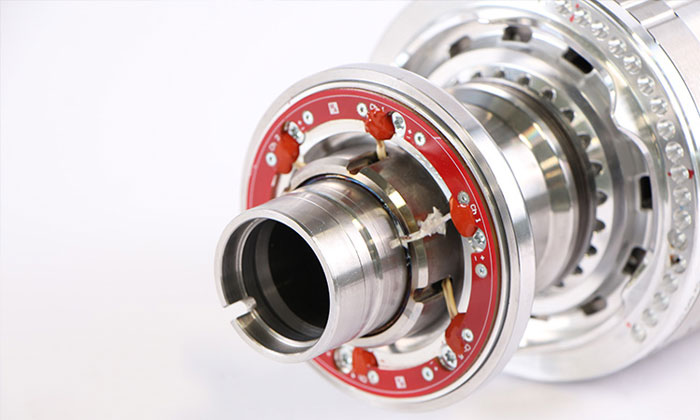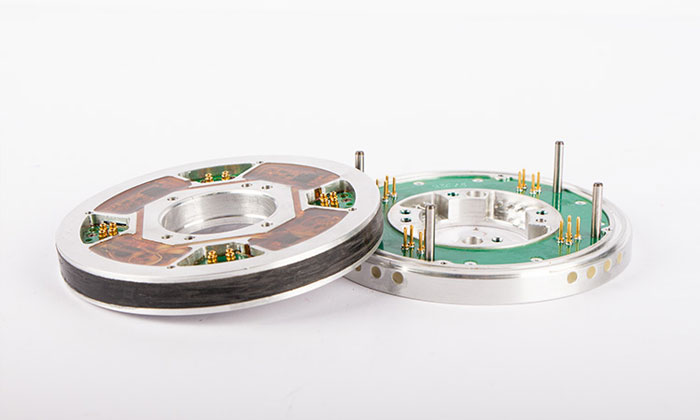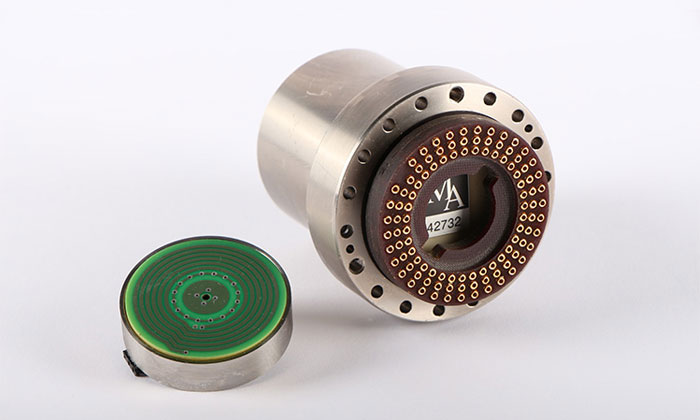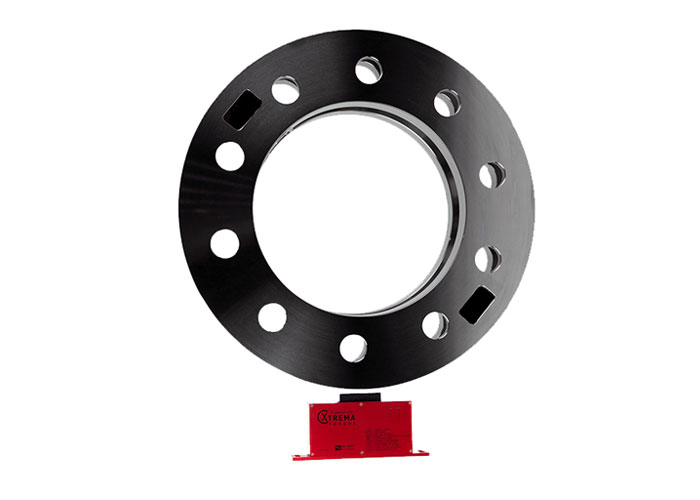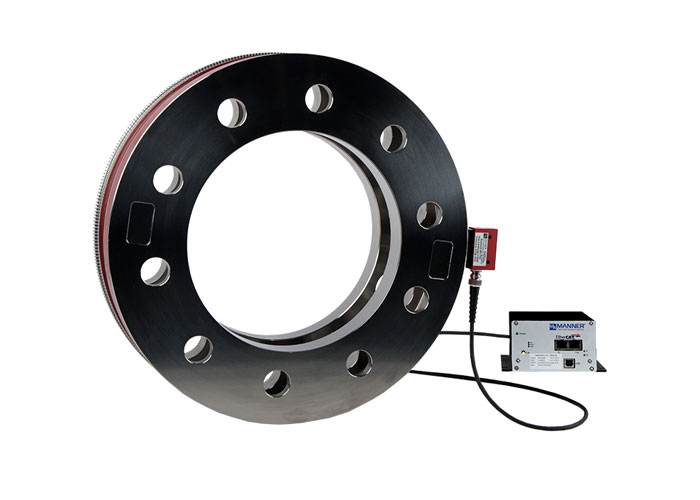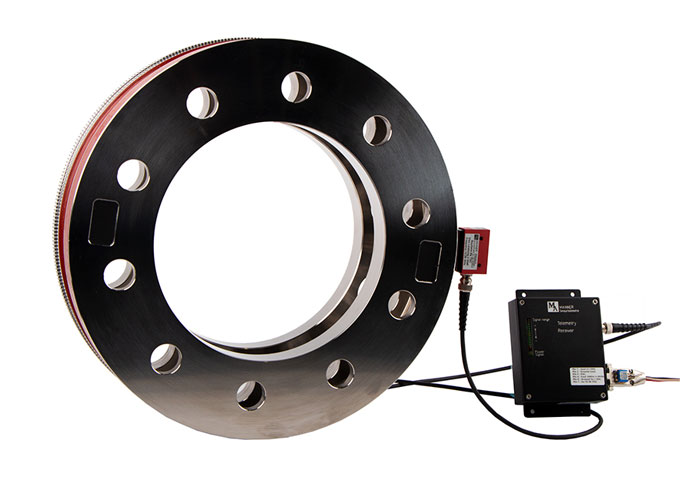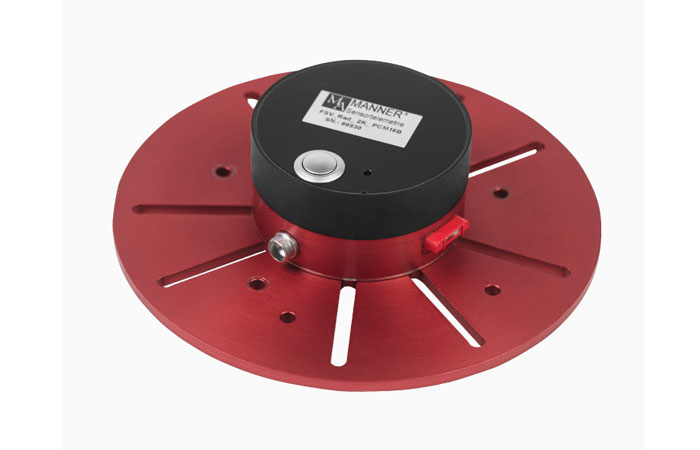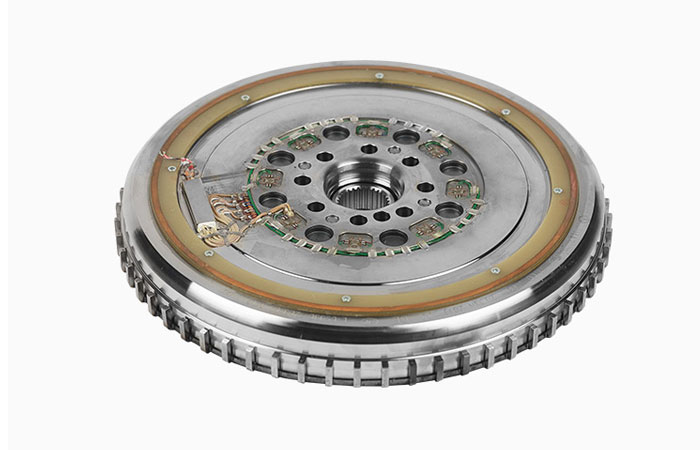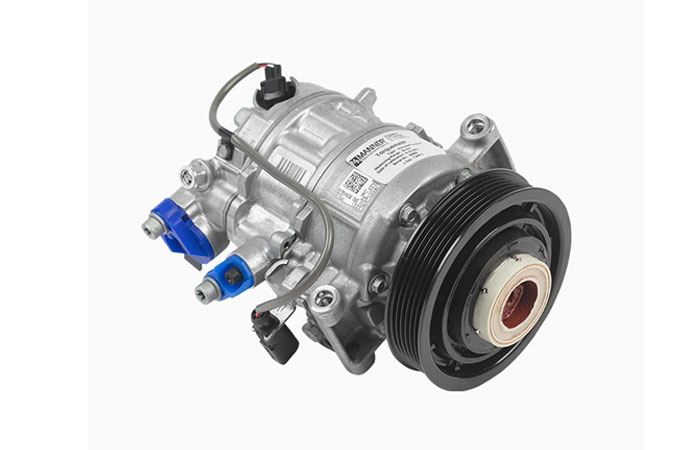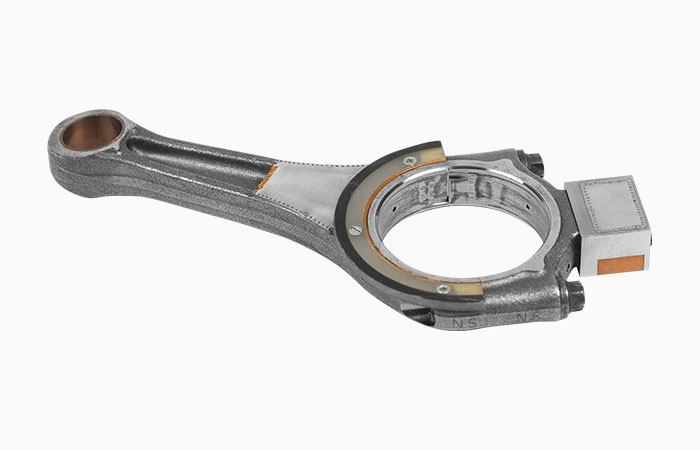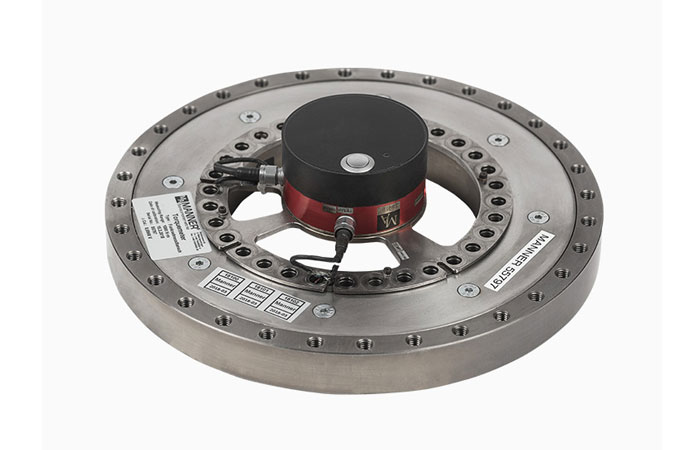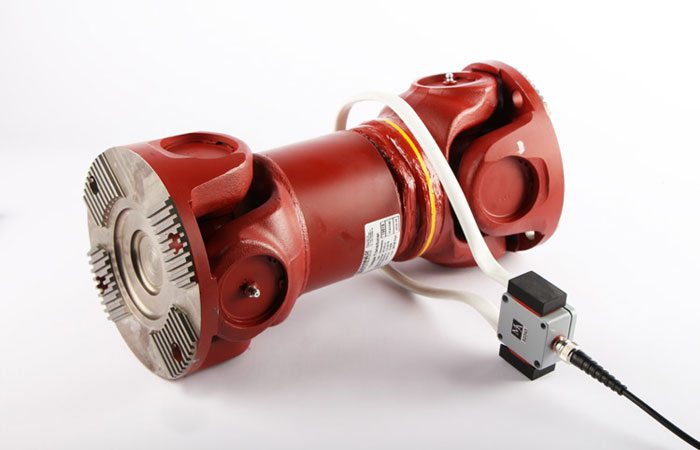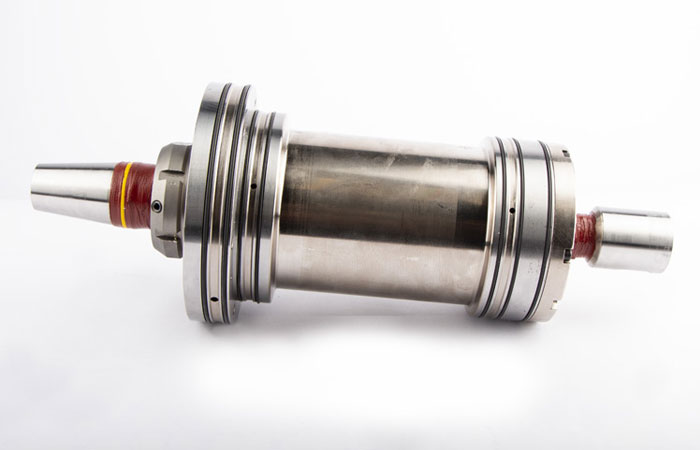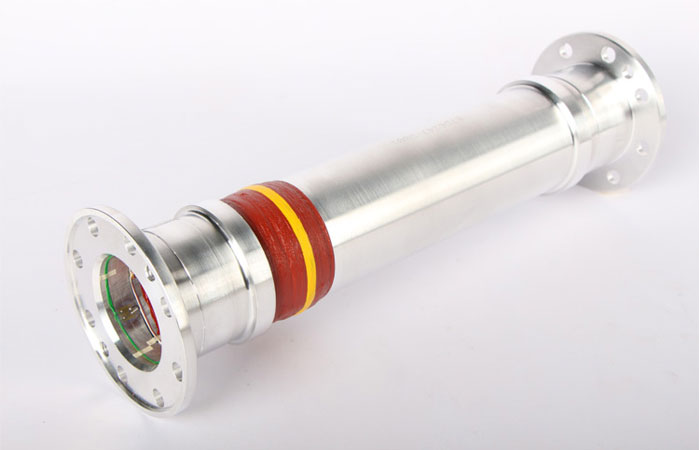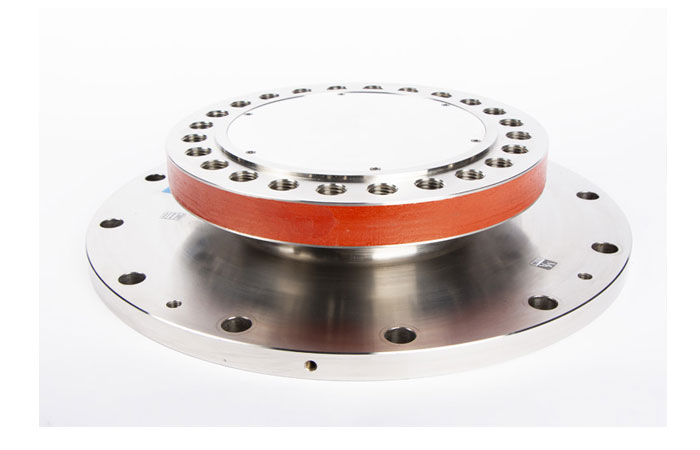Navigation : EXPO21XX > SENSORS & CONTROLS 21XX >
H05: Force, Torque & Weight Sensors
> MANNER Sensortelemetrie
MANNER Sensortelemetrie

Videos
Loading the player ...
- Offer Profile
- We at MANNER Sensortelemetrie have specialized in non-contact sensor signal data transmission for industrial applications. We solve contactless, bidirectional sensor data transmission problems of rotating or moving parts.
Therefore, we develop, produce and deliver:- Single and multi-channel telemetry systems with highest sampling rates (>400 kSample) in modular design in inductive and radio technology
- Customer-specific telemetry systems for special problems
- Rotating torque transducers for test bench and industrial applications – customer specific.
- Cost-effective torque transducers on OEM basis.
- Cost-effective, customer-specific transmission systems for series production.
Product Portfolio
Competent, innovative, solution-oriented.

- Our competence is based on more than 25 years of experience in development and production of sensor-telemetric measuring systems. Innovative new developments, continuous improvements and constant adaptations to the increasing technological requirements of the markets characterize the products and applications of MANNER.
This enables problem solutions from the most diverse industries to be worked out at the highest technical level and implemented with great success.
Our ambition of innovative leadership in the industry is expressed in MANNER’s high development level. Customer benefit and highest precision are our highest goals, whereby quality and reliability are our main focus.
As your competence partner, we do not only see ourselves as a supplier of our products, but also advise you on your tasks, work out proposals for solutions, assemble and support you during start-up and also guarantee our professional support after delivery. What are Telemetry Systems?

non-contact, high-precision, modular
A sensor telemetry system is a complete measuring system and consists of several components. The diagram shown here is intended to provide a basic understanding and to explain the individual components.
A sensor telemetry system can be divided into 5 large blocks.- Sensors
Record the variable to be measured and transmit this as a raw measured value to the measuring amplifier. - Measuring Amplifier
Prepare the signal for transmission. The signal is digitized and error compensated. - Transmission
Inductively, via a high-frequency electric field, using a rotor and stator antenna. - Evaluation Unit
Data reception by a stator antenna. Data is demodulated and checked. -
Data Reception
Data transfer for recording or remote configuration of the measuring chain to a PC.
The core task of the sensor telemetry system is the contactless data transmission based on a high-frequency electromagnetic field. The rotating part, in most cases inductively fed by the HF field, is used for this purpose. This means that the complete rotating part, consisting of the sensors, the measuring amplifier and the rotor antenna are supplied inductively.
This and the fact of contactless data transmission makes our sensor telemetry maintenance-free!
The stationary part of the sensor telemetry system generates the HF field and establishes the coupling with the rotating part. The data transmitted via the high-frequency field are modulated onto the carrier frequency of the HF field and are decoded by the evaluation unit where they are available as a digital data stream.- Sensors

Sensors
- We, the MANNER Sensortelemetrie GmbH, combine various sensors with our sensor telemetry system. This means that we select the suitable sensor for the variable to be measured together with the customer. Either this is done as a side order or as supply by us.
Our multifunctional systems can be adapted to almost any sensor. A selection of typical applied sensors is mentioned here as an example. This is not a complete list of available sensors.- Strain gauges in ¼-, ½-, and full bridge circuit (recording of strains, manufacture of measuring elements for recording axial force, bending moment, torque …)
- Accelerometers
- Pressure sensors
- Temperature sensors (PT100, TC, others)
- Inductive displacement sensors
- Speed sensors
- Bearing encoder
- Angle encoder

Measuring Amplifier
- The measuring amplifier processes the raw value of the sensor. Error compensation at the highest level is already carried out here.
Correction polynomials are stored in the measuring amplifier to compensate for a zero drift or temperature drift of the measured variable. Thus, a highly accurate digital measuring signal is available which can then be transmitted without contact.

Transmission
- MANNER Sensortelemetrie GmbH offers the solution of a problem. In order to define the suitable transmission technology for you, we are at your disposal with our know-how and almost 30 years of experience.
The advantages of inductive transmission are complete freedom from maintenance over decades and insensitivity to interference. MANNER has various transmission frequencies which cover shaft diameter ranges from 10 millimeters to 5 meters. Inductive systems are characterized by:- Absolutely interference-free operation
- Extremely miniaturized construction (12 x 12 x 3mm)
- Environmental resistance (up to 2000°C)
We offer standardized couplings of rotor and stator antennas as well as customized solutions for challenging tasks.
MANNER also offers transmission via WIFI. Several free frequency bands are available for this. With WIFI transmission, higher bandwidths can be handled than with purely inductive systems. We will be pleased to advise you here too.
Particularly advantageous are the systems for inductive or WIFI operation that can be configured by the customer. In WIFI operation, the system can be powered inductively or by batteries. This allows both short-term measurements with batteries and operating times unlimited in time using inductive operation.

Evaluation Unit
- MANNER Sensortelemetrie GmbH offers various forms of a data evaluation unit. From compact designs with integrated stator antenna and compact tube housings up to 19-inch plug-in units for test bench applications.
Depending on customer requirements, a wide variety of output signals can be realized. To name a few:- Analog voltage output
- Analog current output
- Analogue frequency output
- Digital data USB Digital data CAN
- Digital data EtherCAT
- Digital data
- Ethernet PTP
- Digital data of ethernet earth

Data collection and data analysis
- The data recorded by the evaluation unit can be transferred to a PC. There the MANNER data recording software can be used to view the data, record them and remotely configure the measuring chain.
Measuring Amplifier

SV-Flex – Sensor Signal Amplifier Type Samy Flex
- For strain gage, PT100
- Sensitivity: 0.02 mV/V to 11 mV/V
- Bandwidth: 10 Hz to 10 kHz
- Strain gage brigde supply: 3.3 V
- Strain gage bridge resistance: 350 (120, 1000)

SV-Flex – Sensor Signal Amplifier Type Kalimero
- For thermocouple (isolated or non-isolated), Pt100, strain gage
- Measuring range up to 1000°C
- Bandwidth: up to 500 Hz with 1 channel, up to 100 Hz with 16 channels

SV2a – Sensor Signal Amplifier Type 2a (with integrated Rotor Antenna)
- For strain gage, PT100, thermocouple
- Sensitivity: 0.02 mV/V to 20 mV/V
- Bandwidth: 0 (10) Hz to 50 kHz

SV2b – Sensor Signal Amplifier Type 2b (with integrated Rotor Antenna)
- End of shaft, Cartridge, Turbine, Integrated Rotor Coil
- For strain gage, PT100, thermocouple
- Sensitivity: 0.02 mV/V to 20 mV/V
- Bandwidth: 0 (10) Hz to 50 kHz

SV2bx – Sensor Signal Amplifier Type 2bx (with integrated Rotor Antenna)
- End of shaft, Cartridge, Turbine, Integrated Rotor Coil
- For strain gage, PT100, thermocouple
- Sensitivity: 0.02 mV/V to 20 mV/V
- Bandwidth: 0 (10) Hz to 50 kHz

SV2c – Sensor Signal Amplifier Type 2c (with integrated Rotor Antenna)
- End of shaft, Miniatur Cartridge, Turbine
- For strain gage, PT100, thermocouple
- Sensitivity: 0.02 mV/V to 20 mV/V
- Bandwidth: 0 (10) Hz to 50 kHz

SV2d – Sensor Signal Amplifier Type 2d (with integrated Rotor Antenna)
- End of shaft, Miniatur Cartridge, Turbine
- For strain gage, PT100, thermocouple
- Sensitivity: 0.02 mV/V to 20 mV/V
- Bandwidth: 0 (10) Hz to 50 kHz

SV2La – Universal Shaft Transmitter with Sensor Signal Amplifier Type 2La
- non dividable, 1 channel, with/without RMC, without rpm sensor
- Beared wheel transmitter
- For strain gage, PT100, thermocouple
- Sensitivity: 0.02 mV/V to 20 mV/V
- Bandwidth: 0 (10) Hz to 10 kHz

SV2Lg – Universal Shaft Transmitter with Sensor Signal Amplifier Type 2Lg
- dividable, 1 channel, with/without RMC, without rpm sensor
- Beared wheel transmitter
- For strain gage, PT100, thermocouple
- Sensitivity: 0.02 mV/V to 20 mV/V
- Bandwidth: 0 (10) Hz to 10 kHz

SV3a – Sensor Signal Amplifier Type 3a
- For strain gage, PT100, thermocouple
- Sensitivity: 0.02 mV/V to 20 mV/V
- Bandwidth: 0 (10) Hz to 50 kHz

SV3b – Sensor Signal Amplifier Type 3b
- For strain gage, PT100, thermocouple
- Sensitivity: 0.02 mV/V to 20 mV/V
- Bandwidth: 0 (10) Hz to 50 kHz

SV3c – Sensor Signal Amplifier Type 3c
- For strain gage, PT100, thermocouple
- Sensitivity: 0.02 mV/V to 20 mV/V
- Bandwidth: 0 (10) Hz to 50 kHz

SV4a – Sensor Signal Amplifier Type 4a
- For strain gage, PT100, thermocouple
- Sensitivity: 0.02 mV/V to 20 mV/V
- Bandwidth: 0 (10) Hz to 50 kHz

SV4b – Sensor Signal Amplifier Type 4b
- For strain gage, PT100, thermocouple
- Sensitivity: 0.02 mV/V to 20 mV/V
- Bandwidth: 0 (10) Hz to 50 kHz

SV5a – Sensor Signal Amplifier Type 5a
- For strain gage, PT100, thermocouple
- Sensitivity: 0.02 mV/V to 20 mV/V
- Bandwidth: 0 (10) Hz to 50 kHz

SV5b – Sensor Signal Amplifier Type 5b
- For strain gage, PT100, thermocouple
- Sensitivity: 0.02 mV/V to 20 mV/V
- Bandwidth: 0 (10) Hz to 50 kHz

SV5c – Sensor Signal Amplifier Type 5c
- Miniature Patrone
- For strain gage, PT100, thermocouple
- Sensitivity: 0.02 mV/V to 20 mV/V
- Bandwidth: 0 (10) Hz to 50 kHz

SV5d – Sensor Signal Amplifier Type 5d
- Super Miniature Patrone
- For strain gage, PT100, thermocouple
- Sensitivity: 0.02 mV/V to 20 mV/V
- Bandwidth: 0 (10) Hz to 1 kHz

SV7a – Miniatur Sensor Signal Amplifier Type 7a
- Flatchip
- For strain gage, PT100, thermocouple
- Sensitivity: 0.02 mV/V to 20 mV/V
- Bandwidth: 0 (10) Hz to 50 kHz

SV7b – Super Miniatur Sensor Signal Amplifier Type 7b Micro
- Flatchip
- For strain gage, PT100, thermocouple
- Sensitivity: 0.02 mV/V to 20 mV/V
- Bandwidth: 0 (10) Hz to 10 kHz

SV7ke – Miniatur Sensor Signal Amplifier Type 7ke
- Flatchip with integrated Antenna (special for Chain Application)
- For strain gage, PT100, thermocouple
- Sensitivity: 0.02 mV/V to 20 mV/V
- Bandwidth: 0 (10) Hz to 50 kHz

SV8a – Waterproof Sensor Signal Amplifier Type 8a
- Transmitter with Antenna
- For strain gage, PT100, thermocouple
- Sensitivity: 0.02 mV/V to 20 mV/V
- Bandwidth: 0 (10) Hz to 50 kHz

SV9 – Sensor Signal Amplifier Type 9
- Transmitter with Antenna especially for Driveshaftes
- For strain gage, PT100, thermocouple
- Sensitivity: 0.02 mV/V to 20 mV/V
- Bandwidth: 0 (10) Hz to 50 kHz
Transmission Units

Pickup Type 2

Pickup Type 3
- customizable
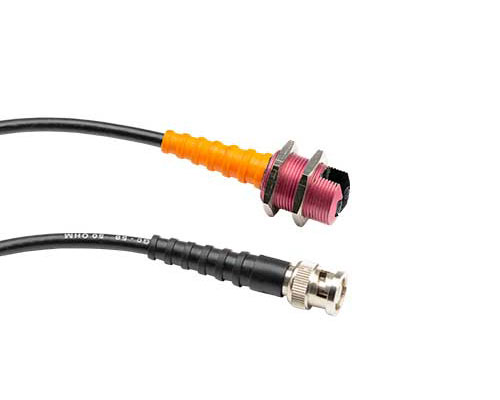
Pickup Type 4b

Pickup Type 5a

Pickup Type 5b

Pickup Type 5d

Pickup Type 5x

Pickup Type 8a

Pickup Type 8b

Pickup Type 8c

Pickup Type 8d

Pickup Type 8e

Pickup Type 8f

Pickup Type 9c

Pickup Type 9d

Pickup Type 9e

Universal Shaft Transmitter
- non dividable
without Amplifier
Evaluation Units

AW_DAnt – Evaluation Unit (integrated Pick Up)
- 1 Channel PCM Receiver
- Bandwidth: 0 t 1 kHz (10kHz)
- Output: 0 to ±10 V, (0 (4) to 20 mA, frequency, binary
- RF power: 1 W, 3 W

OptiMA IP67 – Evaluation Unit
- extraordinary transmission range up to 50 mm
- 1 to 2 Channel PCM Receiver
- Bandwidth: 0 t 1 kHz (10kHz)
- Output: 0 to ±10 V, (0 (4) to 20 mA, frequency, binary
- RF power: 3 W
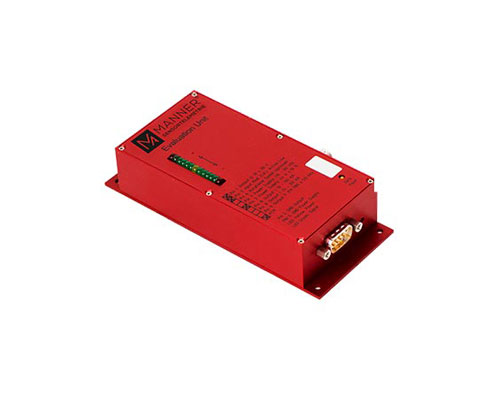
AW_M – Evaluation Unit
- 1 Channel PCM Receiver
- Bandwidth: 0 t 1 kHz (10kHz)
- Output: 0 to ±10 V, (0 (4) to 20 mA, frequency, binary
- RF power: 1 W, 3 W

AW_P – Evaluation Unit
- 1 Channel PCM Receiver
- Bandwidth: 0 t 1 kHz (10kHz)
- Output: 0 to ±10 V, (0 (4) to 20 mA, frequency, binary, USB, CAN
- RF power: 1 W, 3 W, 5W

MAW_F – Evaluation Unit Digital Receiver
- 1 to 64 Channel PCM Receiver
- Bandwidth: 0 t 1 kHz (10 kHz, 50 kHz)
- Output: 0 to ±10 V, (0 (4) to 20 mA option
- Digital interface (option): USB, Ethernet (TCP/IP), EtherCAT

AW42TE – Evaluation Unit (42TE)
- Multi Channel PCM Receiver 42 TE
- Bandwidth: 0 t 1 kHz (10 kHz, 50 kHz option)
- Output: 0 to ±10 V
- Interfaces (option): USB

AW84TE – Evaluation Unit (84TE, 3HE)
- Multi Channel PCM Receiver 84 TE
- Bandwidth: 0 t 1 kHz (10 kHz, 50 kHz option)
- Output: 0 to ±10 V
- Interfaces (option): USB

AW84TE – Evaluation Unit (84TE, 6HE)
- Multi Channel PCM Receiver 84TE HE6
- Bandwidth: 0 t 1 kHz (10 kHz, 50 kHz option)
- Output: 0 to ±10 V
- Interfaces (option): USB

AW_ES_MGC – Evaluation MGC Plugin Unit
- 1 Channel MGC-Plugin Unit PCM Receiver
- Bandwidth: 0 t 1 kHz
- Output: 5 to 15 kHz
- RF power: 3 W

AW_ES – Evaluation Unit
- Multi Channel PCM Receiver ES
- Bandwidth: 0 t 1 kHz (10 kHz, 50 kHz option)
- Output: 0 to ±10 V
- Interfaces (option): USB
Customized Telemetry

According to your requirements!
Rotation and translation, nothing works without movement!
- Machines are based on moving parts and it is precisely these machines that are to be optimized. While in the past centuries machines were developed to defy eternity and had a running time of many decades or even a century, today different laws apply.
Machines and vehicles must be efficient. They must be developed in such a way to achieve an optimum. An optimum in terms of material consumption, energy consumption – and weight, while maintaining performance and agility. To emit no or as little CO2 as possible, not to require any downtime and therefore to be low-maintenance. This challenge of optimization at various levels of engineering science is enormous.
In order to achieve this, measuring systems of the highest flexibility and precision are required which influence the developed element as little as possible. The modular design with miniature modules allows any form factor for rotor electronics. This allows measurement technology to be implemented even when the installation space is fully utilized. Particularly helpful is the flex telemetry developed by MANNER, which allows the telemetry to be wrapped around a shaft body.
The system should be robust, withstand the most adverse conditions and at the same time deliver highly reliable and highly accurate measured vales with extreme bandwidths at the highest speeds.
A MANNER sensor telemetry system won’t let you down and is designed and developed to tackle exactly your challenges.
If you are no longer able to go any further, then come to us!
MANNER is your partner for success!
MasterMind

-
A revolution is coming - Modular, flexible, remotely expandable and freely configurable near-field telemetry for all common sensor types with 24 bit
In the past, measurement technology was often ordered for a specific measurement task. However, the costs of the measurement technology make it an investment good, which should ideally be suitable for different tasks. Since the measuring tasks of metrology engineers are manifold, especially in the rotating area, several different telemetry systems often had to be procured for the most diverse measuring tasks in the past.
Sometimes one channel is sufficient for a standard torque measurement, but often other variables such as strain, pressure, axial force or even temperatures with PT 100 or thermocouples have to be measured later in a measurement task. Instead of 1-4, there are often 8, 12 or even 16 or more measuring channels with different sensor applications. The user-friendliness and connectivity of different sensor types are therefore of decisive importance.
A lengthy evaluation of possible future measurement tasks is in turn time-consuming and difficult to do in advance. Especially in times of Covid-19, budgets are sometimes tight or only small investments are easily possible without a long approval process – here, a flexibly configurable and expandable system offers enormous advantages.
In order to provide our customers with the greatest possible flexibility, our new multi-channel telemetry MasterMind offers flexibly configurable telemetry that can also be expanded retrospectively.
This is a measuring amplifier construction kit – modular, flexible, remotely expandable and freely configurable sensor signal amplifiers. 
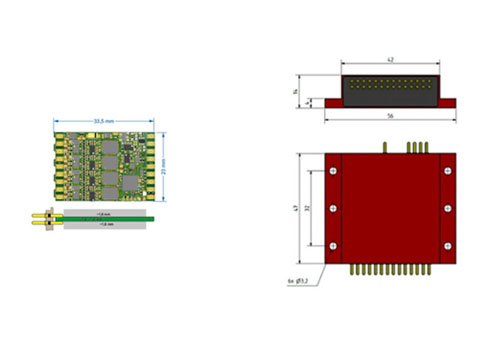


The MasterMind module
- In the compact 4-channel design, the system can be purchased in standard enclosures as well as in customised enclosures. The 4-channel modules and a power supply module can be expanded as desired by purchasing several modules. The other modules are controlled by flexible interconnection via the master module. In total, between 4 and up to 128 channels can be realised with one system.
The possible distance between the individual 4-channel modules is also worth mentioning. Up to 500mm distance per module can be realised here. This means that even in large and complex machines with widely spaced measuring points, a measurement can be realised with one system.
Each module is very compact with the dimensions: 33.5 mm x 23 mm x 5 mm and can therefore be used in a variety of ways if the installation space does not require direct application.
Of course, several 4-channel modules can also be built into one housing:Module Dimensions 4-channel measuring amplifier 48,6 x 41 x 10 4-channel measuring amplifier – turbine application 44,0 x 37 x 14 8-channel measuring amplifier 48,6 x 41 x 20 12-channel measuring amplifier 48,6 x 41 x 20 13-channel, multi-channel and custom enclosures available

Remote sensor selection
- By means of software, the respective sensor for the respective channel can be selected and parameterised remotely. The user can select from a variety of sensor types (half, full, quarter bridge, isolated and non-isolated thermocouples, RTD sensor, etc.) and has the option of performing the hardware tests.
Remote adjustable sampling rates
By means of software, the desired sampling rate resp. the acquired signal bandwidth of the measuring signals can be selected remotely. This allows filter frequencies to be selected according to requirements and annoying interfering signals to be suppressed.
The MasterMind module can be used with all common MANNER transmission methods: for small transmission rates/low module numbers up to high-speed. The concept is completed by our new MAcquisition measurement, configuration, data acquisition, monitoring and data analysis software. Conveniently, the connection is also displayed when configuring the sensor type, thus offering maximum user comfort.
In addition to monitoring functions for your telemetry system, the software allows new data visualisation options, including an integrated oscilloscope that offers extensive online analysis options.
Extension of the number of channels of the system
With the associated programming unit, up to 128 channels of the system can be re-parameterised and interconnected. The decisive advantage: You may have only bought a 4-channel telemetry system in the first step, but this can now be expanded.
If initially only a 4-channel system is desired, the system is pre-configured by us for this purpose.
By importing a new configuration, the system can be expanded to up to 128 channels.
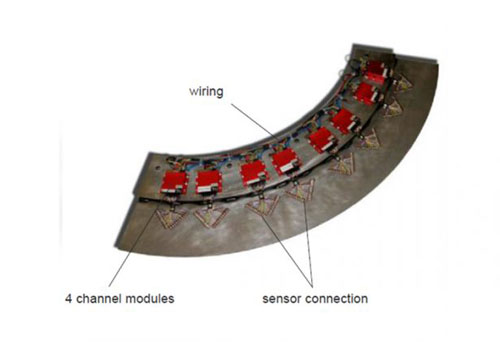
Cascaded 4-channel amplifier expanded to 34 channels
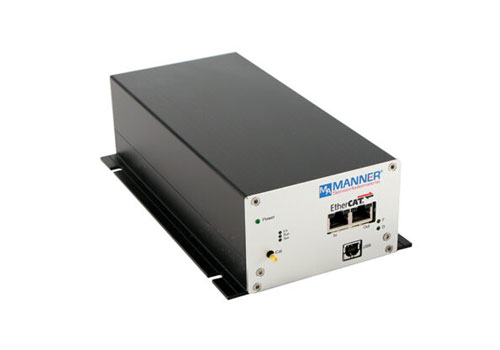
Design of a digital evaluation unit – optionally also possible in analogue form in the table-top unit
OEM & Series Production

customized product and series solutions
As complex and specifically designed as industrial plants and production facilities are, MANNER manufactures the appropriate measuring applications for tough continuous use. In the field of oil-free gas and air compression as well as in the application field of extruder screws, precise measurements of torques, forces and temperatures are ensured by the non-contact measurement data transmission of our sensor telemetry applications. Long-term monitoring of extruder shafts is therefore child’s play, as is automated machine monitoring of thermal loads.
MANNER Sensortelemetrie GmbH offers miniaturised applications for the monitoring and protection of automated production systems for recording a wide range of drive powers. This means that production can be stopped automatically and trouble-free if the load limits of individual components are exceeded. Our company develops such early damage detection and damage prevention devices for a wide variety of Production plants of various industries and manufacturers.
In this form, MANNER’s easy-to-assemble measuring systems make a decisive contribution to optimising the service life, strength, efficiency and efficiency of production plants. As a leading specialist for non-contact and robust transmission technology, MANNER also offers its customers tailor-made OEM solutions.
Together with you we develop innovative and attractive solutions. We see ourselves as a partner who supports you throughout the entire process, from the idea through design to the technical implementation in your product.
The solutions can be produced in-house for you at the desired time and with the highest quality or passed on to you in the form of a license.
In this way, we already produce a wide variety of different edition sizes for national and international partner companies.
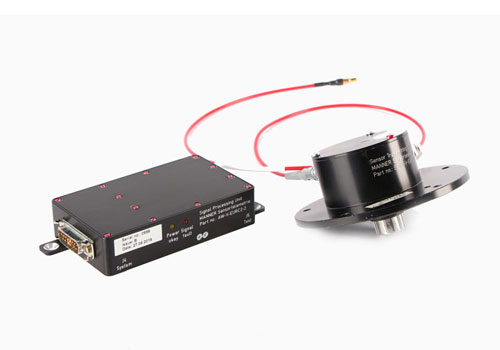
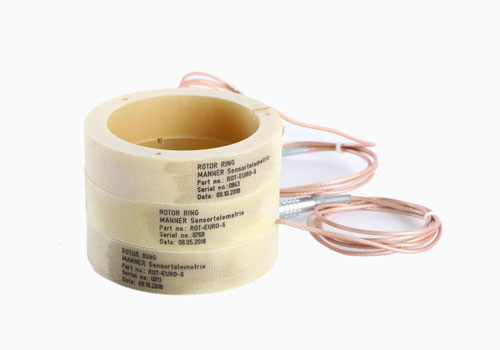
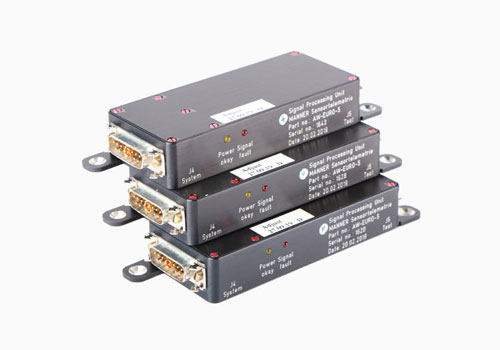




Selected OEM solutions
- Helicopter (mast bending moment monitoring)
The main rotor of a helicopter provides both the lift of the aircraft and the direction of movement and is therefore a control element.
The loads introduced into the system lead to bending and torques of the helicopter mast. Since the mast has no redundancy, it is a critical component of the helicopter in terms of reliability.
For this reason, the moments acting on the mast are carefully monitored.
The dynamic bending moment of the mast of various helicopter models is monitored by a monitoring system developed by MANNER.

Transmissions (predictive maintenance, load collectives, process control)
- To monitor and protect automated production equipment, MANNER Sensortelemetrie GmbH offers miniaturized applications for recording a wide range of drive powers. This means that production can be stopped immediately and automatically if the load limits of individual components are exceeded.
MANNER develops such early damage detection and damage prevention devices for a wide variety of manufacturing systems in a wide variety of manufacturing processes. Evaluate the most accurate measurement data curves for critical components in your production plant and optimize your systems for service life, strength, efficiency and thus efficiency.
Benefit from the advantages of MANNER sensor telemetry:- Accurate recording of torques, bending moments, temperatures, compressive and tensile forces at maximum speeds
- Non-contact data transmission by means of inductive coupling
- Easy utilisation of the measurement data via evaluation unit and specially programmed telemetry software from MANNER
- High accuracy and safety of the digital measurement data
- High temperature resistance
- Miniaturized and lightweight design
- Extremely low assembly effort

Cold rolling industry (process control)
- In the steel industry it’s “hot”. Not only in terms of temperature, but also in cold rolling mills the machines have to work hard.
The maintenance of machines is of great importance and an unforeseen breakdown of a machine has far-reaching consequences for the whole production. The keyword here is “predictive maintenance”. In this way, not only ” necessary ” maintenance can be predicted and the process can be shut down, but also the production quality of the machine can be monitored. This ensures protocol security, especially for international production lines.
The “retrofit” and thus the integration into the existing production process and production machines was important to the customer. The same applies to the maintenance-free measurement technology and the real-time acquisition of measurement data.
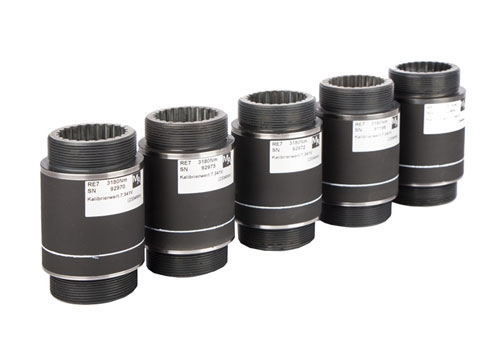
Extruder
- Extruders are widely used in the industrial production of plastics, food and cosmetics. In addition to single-screw extruders with a simple design, twin or multi-screw extruders require a complex gearbox to drive the counter-rotating or co-rotating extruder screws.
More and more sophisticated extruder shapes require gear technology that transfers the highest torques evenly to all screw shafts in the tightest of spaces. The actual torques at the screws and the exact distribution of these torques to the individual extruder shafts can be precisely determined with the aid of MANNER sensor telemetry.
You can finally answer critical questions regarding your extrusion operation, such as how:- What torques do the screws actually have to cope with?
- Is the load distribution evenly distributed over all screw shafts?
- Can the extruder control be better adapted to the occurring torques and forces?
- How does the extruder and its individual screw shafts behave in different production conditions?
We apply your coupling sleeves to the drive shafts with the proven sensor telemetry for extruder shafts and the proven MANNER sensor technology records the real torques where they occur. These torques are transmitted without contact via an induction antenna to a corresponding evaluation unit, your computer or your control system. In addition, specially developed software records the measured values, for example for long-term monitoring.
Use in Ex-Areas

Developed for the explosion-proof area
MANNER also offers solutions for the chemical, oil and mining industries. Here there is usually a potentially explosive atmosphere. ATEX approval is essential.
MANNER Sensortelemetrie offers measuring systems with ATEX approval that enable non-contact measurement within explosive atmospheres (gases and dusts). This approval is available for standard and customized measuring flanges as well as telemetry systems.
Here the evaluation unit is located outside the hazardous area and is connected via a coaxial cable to the pick-up stator antenna located in the Ex-zone.
The rotor telemetry with passive sensors or torque measuring flanges on the rotating parts are supplied with energy via the pick-up, in return the measured data are tapped and transmitted to the evaluation unit.
An application in the Ex-area is possible using standard measuring flange of the company MANNER as well as on shafts, flanges etc. provided by the customer.
The powerful sensor telemetry system from MANNER enables you to monitor or record static and dynamic variables economically and precisely, such as:- Torque
- Compressive and tensile force
- Bending moment
- Acceleration
- Temperature
- Speed
Telemetry Kits
OptiMA - 1-/2-Channel Kit

OptiMA Plug & Play System for 1-2 channel solutions
contactless. automated. plug & play.The system is ideal for, among other things:
- wind power applications
- propeller shafts on ships
- Drive shafts in steelworks
- for measurement technology
- for test benches for diploma or student research projects in the field of mechanical engineering

OptiMA – outstanding transmission distance up to 50 mm and protection class IP67
- To simplify on-site measurement technology applications, MANNER Sensortelemetrie now also offers a module for automated adjustment of the rotor side and the stator side for all systems.
The inductively supplied measuring technology – sensor and measuring amplifier – are optimally matched to the stator system in several cycles. MANNER thus enables test engineers without extensive knowledge of sensor telemetry or training in this field to reliably and precisely record measurement signals on rotating shafts.
The new integrated automatic alignment enables optimum data and energy transfer between rotor and stator unit.
All inductive MANNER systems, including OptiMA, work without batteries or accumulators and are absolutely maintenance-free.
Annoying, heavy batteries with unbalance problems and their replacement are not necessary. This makes the rotor assembly a lightweight.
The OptiMA Kit at one glance- Sensor (DMS)
- Sensor signal amplifier (in all common designs as well as a flexible substrate that can be wound around the shaft) with adjustment module
- Rotor antenna kit (copper foil; ferrite; brass tape and cover tape)
- Evaluation unit IP67
- 1- and 2-channel operation (2 channel optional)

Application of an OptiMA Kit (rotor side)
- Applied shaft with strain gauge sensor; 3c sensor signal amplifier and rotor loop
The system can be used directly and, if necessary, can be configured (sensor name; sample rate; information storage etc.) and calibrated (zero and gain settings) by the MANNER “RMC-Software”.
The adjustment module is miniaturized and therefore fits into all common MANNER amplifier housings. The module can be used individually or in conjunction with a Flex amplifier. In the latter case the adjustment module is directly integrated on the Flex sensor signal amplifier.
The module can be used both with our popular OptiMA sensor telemetry kit (evaluation unit with integrated receiving antenna and very long ranges (see Figure 1)) and with other antenna components such as the 8a Pick Up and the various evaluation units.
MANNER thus offers a plug & play system that can be configured in a consistent modular fashion.

OptiMArφ – on the shaft
- Here the rotor antenna is laminated onto the shaft. The sensors are suitably placed and the measuring amplifier is applied to the shaft. You will receive all necessary components with the OptiMArφ Everything else is Plug&Play.
Characteristic for all OptiMA systems is the large transmission and power supply distance of 50 mm between the rotating and the static component. This technology is purely inductive and therefore completely battery-free. As with all MANNER components, there are no signal drop-outs even in the event of strong electromagnetic interference. Thanks to the proven inductive transmission technology there are also no interference problems with radio frequencies. OptiMA is therefore the definition of robust sensor telemetry!
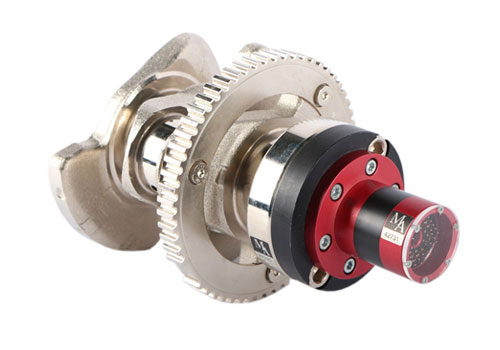
OptiMArφ – on the shaft
- For applications at the shaft end MANNER offers a rotor component which is screwed onto the shaft end. The sensors are placed and married to the rotor electronics. Everything else is Plug&Play.
Characteristic for all OptiMA systems is the large transmission and power supply distance of 50 mm between the rotating and the static component. This technology is purely inductive and therefore completely battery-free. As with all MANNER components, there are no signal drop-outs even in the event of strong electromagnetic interference. Thanks to the proven inductive transmission technology there are also no interference problems with radio frequencies. OptiMA is therefore the definition of robust sensor telemetry!
Dual Use - Radio / Induction

Dual Use Telemetry Kit – radio and/or inductive
Radio systems – data via radio (with optional inductive supply)
The MANNER radio sensor telemetry was developed especially for rough use for measuring tasks with increased environmental requirements. In addition to the radio cell, the system consists of miniaturized measuring amplifiers which allow direct connection of strain gauges or thermocouples. The sensor signals are amplified, filtered against aliasing and digitized. The digital data are encoded and a security password (CRC) is generated. The data is then imprinted on the RF carrier using FM modulation.- The radio transmission eliminates any kind of cable connection.
- The integrated CRC data protection system detects and completely eliminates the usual sporadic transmission interference in radio transmission.
- The system is available with 1, 2, 4, 8 or 16 channels.
- For each channel a separate AD converter and power supply is available. If a sensor is short-circuited, there is no effect on the remaining measuring channels.
The company MANNER Sensortelemetrie has a further innovation in the proven radio sensor telemetry system.
Up to now it was only possible to condition the measuring amplifier when the rotor was at a standstill. This innovation now allows the conditioning of the measuring amplifier (zero and gain adjustment) even over longer distances. This new functionality gives the radio telemetry system the same flexibility as the inductive telemetry system.
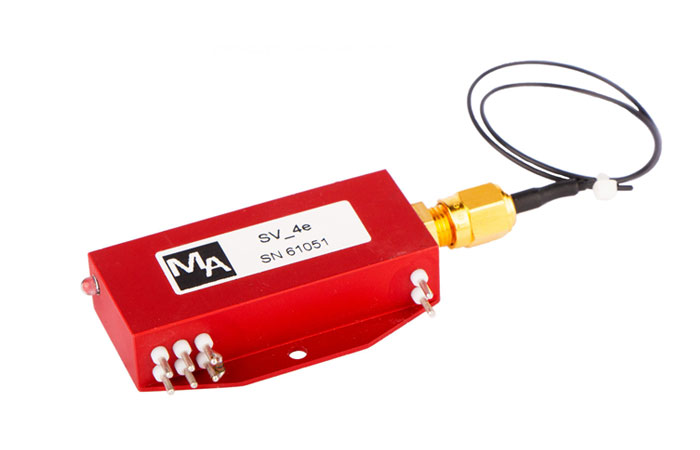
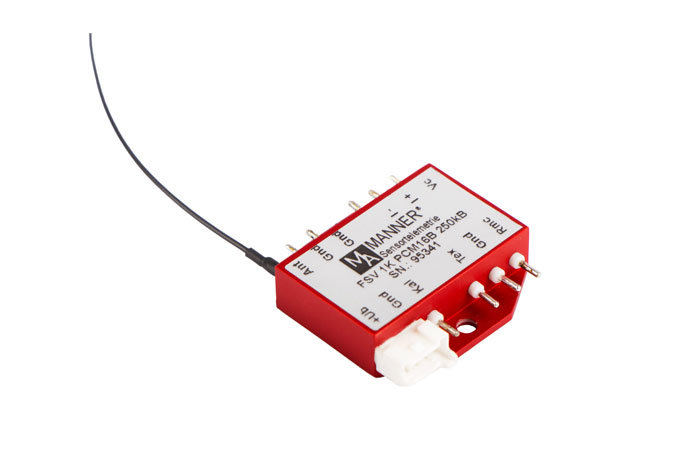



Radio systems – data via radio (with optional inductive supply)
- A special variant now allows the optional transmission of measurement data both inductively and by radio. This combines the respective advantages of the different system types. As is well known, the battery-powered radio telemetry system is characterized by very simple handling, as there is no need to install a pickup and rotor induction loop. A special feature is that the system has a range of up to 50 m in battery operation. This is ideal for short-term so-called “quick and dirty” measurement tasks. Nevertheless, multi-channel signal bandwidths of up to 40 kHz can be realized. In contrast, the inductive sensor telemetry system is characterized by unlimited operating time and extreme robustness under difficult environmental conditions. Interferences are irrelevant. Depending on the application, one or the other system type is advantageous.
The new system can be used both for short-term measuring tasks using a battery and for long-term measurements with inductive supply with unlimited operating time. Measurement service providers therefore only need to carry one system type with extremely low weight in their hand luggage, making logistics and maintenance considerably easier. This means that even a system mounted for short-term measurement can be converted to long-term measurement in the simplest possible way if required.
As with the existing systems, the measured values are digitized with 16 bits and transmitted in a code-secured way. This guarantees, in addition to high accuracy, a high reliability despite radio transmission. The incoming measurement signals are of extraordinary quality. Signal interference is a thing of the past. Even the usual remote control with the sensitively adjustable measuring ranges and autozero are still available. In any case, the measurement data is transmitted digitally without loss of accuracy and made available for further processing in analog form or via the CAN bus, USB, EtherNet or EtherCat interfaces. This means that a measurement service provider is optimally equipped for all tasks with one hardware.

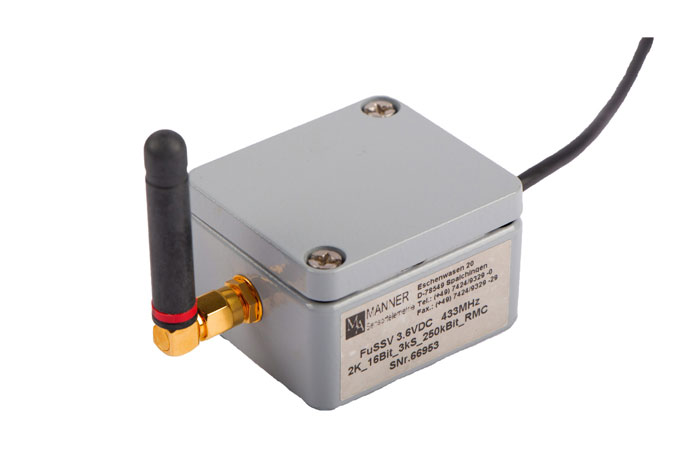
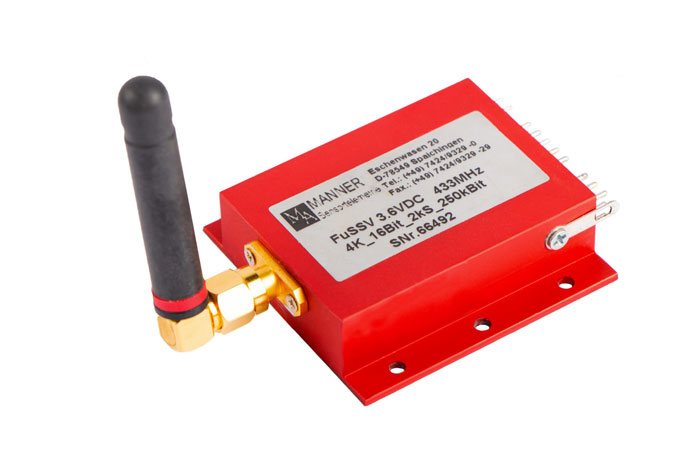
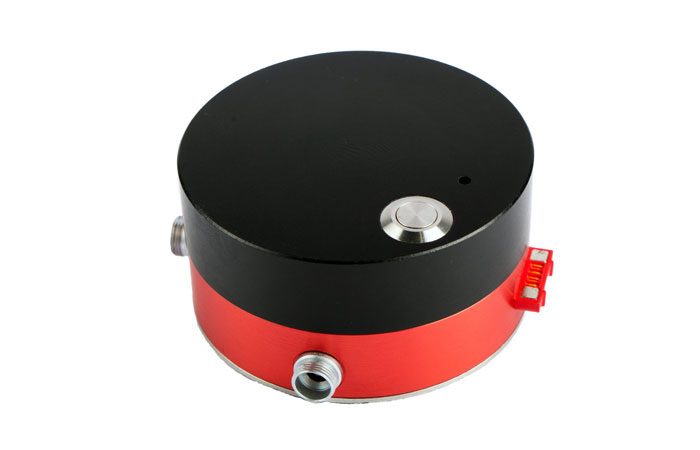




Radio systems – data via radio (with optional inductive supply)
- The MANNER radio-based wheel signal transmitter has now passed its baptism of fire. As part of further development, a special version for multi-channel temperature measurement on the wheel has now been developed based on thermocouples type K, measuring range -50 … 1000°C. The measured temperature values are already digitized at the rotor with 16 bits. The digitized values are transmitted by radio in time multiplex to the common, particularly compact receivers. The temperature data is transferred directly to the user system via the CAN bus interface. There is no more analog signal processing in the receiver. Each temperature channel has its own address, which ensures that the user can assign it. A special feature is the integrated data backup by means of checksum. Faulty temperature data is not passed on. This completely suppresses any interference signals caused by radio interference in the measurement recording. A further feature is the power-saving technology. The integrated rechargeable battery allows a measuring time of 300 hours without recharging. Optionally, the rotor transmission units are available waterproof with protection class IP67.
The coupling of the energy for recharging the battery is inductive. The temperature resistance from -35 to 120°C is particularly noteworthy.
Torque Measurement Technology
- The MANNER torque flanges can be used to measure both static and dynamic torques on rotating or stationary shafts and machine flanges. The power flow over a shaft can be calculated directly from the quantities torque and speed. In the age of automation and the demand for ever better efficiency, these two quantities are becoming increasingly important.
XtreMA / 50 N.m - 10 kN.m

highly accurate. flexible. efficient.
XtreMA TORQUE – the highly accurate measuring flange series for flexible use from 50 N·m to 10 kN·m
For the vehicle sector, the Co2 discussions are demanding ever higher requirements in terms of accuracy and resolution of the torque measurement signal. For further optimization of the efficiency, the accuracy of the dynamic torque measurement is of fundamental importance.
MANNER’s answer is the new XtreMA product series.
The new XtreMA series of measuring flanges from MANNER Sensortelemetrie offers not only an attractive price but also the typical MANNER advantages for the most varied installation spaces and connection requirements with the highest accuracy.
A test bench measuring device for flexible use
Torque acquisition is the central parameter in the development of combustion engines, hybrid and electric modules – and accordingly also on the test benches used for validation.
Since the optimization potentials are getting smaller and smaller, high-precision measuring equipment is necessary to be able to work out these small improvements in a reproducible way. At the same time, the desire for real test conditions (idle, partial and full load, as well as a wide operating temperature range) is high.
The new XtreMA TORQUE product range from MANNER offers an improved alternative to the torque flanges currently used on test benches.
The DIN flange pattern used, which is compatible with HBM torque sensors, allows simple integration into new and also existing test benches (retrofit). The optional hollow shaft flange design contributes to the flexibility of the XtreMA TORQUE for use in test benches. This is an immense advantage for coaxial drive concepts, since an additional drive train or additional cables can be routed inside the measuring flange.
The flange series is generally specified with accuracy class 0.05. In the extended version, accuracy class 0.01 is also available.
For electric motor test benches, the extremely high-speed stability is particularly relevant. The new MANNER design also takes this requirement into account and offers a speed stability of up to 32,000 min-1.
Outstanding properties of XtreMA measuring flanges:- compact pick-up no enclosure necessary
- Ranges of up to 10 mm
- Hollow shaft design optional
- IP67 optional
- extended temperature range -50 to +160°C

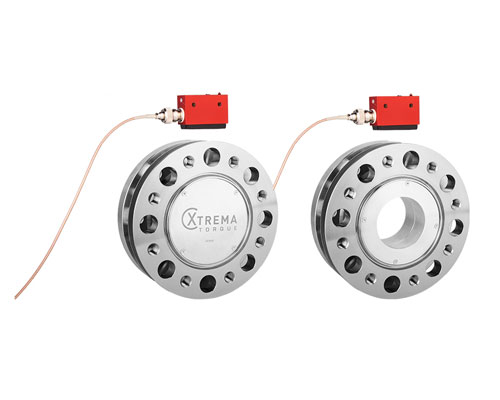


XtreMA TORQUE 2.0 - the improved torque transducer
- The class accuracy is only valid for a ∆T 10°C at a nominal temperature of +22°C. At outside this range, the errors, zero drift Tk0 and sensitivity TKc, increase considerably. The main source of error is the behavior of the torsion body itself – both the zero drift and the measured value errors must be mentioned here. The temperature dependence of these error types is serious.
The measured value error is significantly influenced by the modulus of elasticity. Depending on the quality of the steel, the E-module deviates by up to 24%/100°C. The error of a measuring amplifier is here smaller by more than a power of ten and thus subordinate to other sources of error, such as the drift of the Young’s modulus.
As is well known, both the drive machine and the test specimen supply considerable thermal energy when operating under full load. This leads inevitably to the fact that the heating of the measuring flange is beyond the specification of the class accuracy. A fatal situation for friction power measurements.
Especially in test benches for combustion engines, the measuring flange is additionally heated by the waste heat of the engine during operation. Due to the proximity to the engine, the shaft temperature can rise up to +160°C.
Air conditioning of the flange, in turn, is often hardly possible. Therefore, the influence of the increased ambient temperature on the measured values is a common problem in reality.
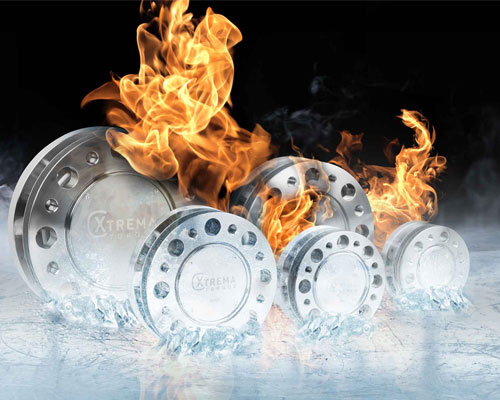
Compensation for environmental influences
- The XtreMA TORQUE Measuring Flange offers the option of correcting these additional errors caused by changes in environmental temperature. This makes it possible to significantly reduce the magnitude of the measured value deviation over the entire specified ambient temperature (from -40 °C … +160°C).
MANNER offers an optional new type of nonlinear electronic correction of errors in the zero point and sensitivity caused by temperature influences. MANNER thus defines a new class of zero-point stability over a temperature range of -40 to +160°C. This guarantees accuracy class 0.05 over the entire operating temperature range.
Due to these corrective measures, both the zero-point deposit and the change in the measured value over the temperature are negligible.
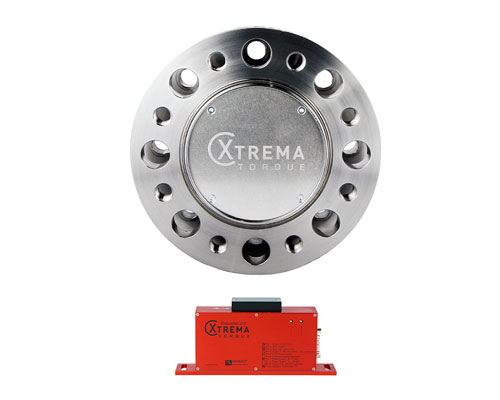
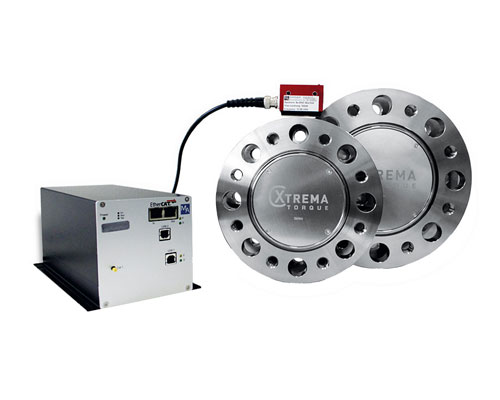
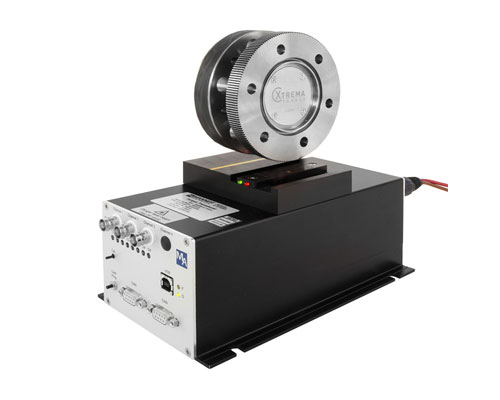



Modular composition of the measuring equipment – evaluation unit and pick-up
- Particularly noteworthy is the flexible topology of torque acquisition with MANNER. The contactless, inductive sensor telemetry transmission technology guarantees maintenance-free operation.
Due to the simple tapping of the measuring signal by means of a simple, space-saving pick-up (no enclosure necessary) and a distance of up to 10 mm, uncritical operation is possible even with shaft vibration. The compact design of the evaluation unit with integrated pick-up makes handling particularly easy. - Optionally, the Pick Up can also be remotely connected to the evaluation unit via a cable connection.
A characteristic feature is that the extremely compact pick-up allows signal pickup even in cramped installation conditions (shaft protection). Of course, the pick-up can also be exposed to the extended environmental temperature range. - In another special variant, the Pick Up can be mounted up to 40 mm from the measuring flange. It is a complete evaluation unit with integrated antenna and speed measurement. A collision is practically impossible. This is particularly advantageous for construction machine test benches or drive shaft applications.
The possible distances between the antennas ensure that no damage to the measuring equipment can occur in the event of vibrations in the line. Handling on site is also considerably simplified, as there is no need for time-consuming mounting and alignment.
Depending on the version, the measurement data itself can be transferred to the data acquisition system either as a classic analogue signal (voltage, frequency or current output) or as a digital signal via an interface, e.g. CAN.- Particularly noteworthy is the flexible topology of torque acquisition with MANNER. The contactless, inductive sensor telemetry transmission technology guarantees maintenance-free operation.

Calibration
- In-house for fast delivery times and flexibility – Thanks to the automated and expanded calibration laboratory with 6 test benches, MANNER In-House can offer a comprehensive range of calibrations and uses this both for its own products and for calibration services.
XtreMAX 15 kN.m - 500 kN.m

XtreMAX – The torque flange series for power and efficiency increases in large engines, wind power, marine engines as well as gas turbines and much more
Increases in performance and efficiency, also for large engines such as marine engines and construction machinery, are becoming increasingly relevant due to new legal requirements. Examples of this are the demands for CO2 reductions through environmental agreements such as MARPOL, or the EU exhaust regulations for mobile machinery.XtreMAX Large Flanges : Our Solution
- The central measured variable for determining the load signal is the torque in conjunction with the speed. For high nominal torques in the field of large engines, wind power, marine engines and gas turbines, the XtreMAX torque flange series offers an attractive and highly accurate measurement solution for power and efficiency increases, to realise compliance with norms as well as various other measurement tasks.
Maintenance-free operation is a matter of course thanks to the wireless, inductive power supply, which simultaneously realises a measurement signal pick-up.
Regardless of whether static or high-frequency measurement signals need to be recorded, the system offers the solution.
The standard bandwidth of the measuring signal of 1 kHz can optionally be extended up to 10 kHz. The system is robust against interference fields and can be used anywhere, even close to the electric motor.
The design of the short torque flanges, which has been well proven for years, also offers the possibility of a retrofit. Characteristic for the XtreMAX torque flange series is the compact shape, which at the same time enables a high overload resistance and robustness against parasitic forces such as the bending moment.
The integrated and highly accurate electronics used for data evaluation and transmission of the XtreMAX torque flange series enables the highly accurate recording of the torque including the compensation of temperature influences in the real environment.
By using our digital sensor telemetry, the measurement signals can be tapped from the rotor without any problems. Usual radial distances between rotor and stator of 10 mm and axial displacements of 100 mm can be realised without any problems.
Optionally, speed measurement can also be integrated.
In addition to the compact XtreMAX evaluation unit with integrated pick-up and the classic analogue signals with 0…±10V / 4…20mA as well as the frequency output 60 +/-30 kHz, the stator unit with remote signal pick-up is also available for installation in the control cabinet. In addition, the output of digital signals via EtherCAT, CAN or Ethernet is also possible here.
The torque series is available as standard with the following nominal torques:
15 kN·m, 20 kN·m, 35 kN·m, 50 kN·m 100 kN·m, 200 kN·m, 300 kN·m, 500 kN·m
The XtreMAX series, which can thus be used in many areas of application, has proven itself for years as an outstanding solution, particularly in plant construction, mechanical engineering, shipbuilding, gas turbines and in the construction machinery industry.
Of course, we are also prepared to carry out customised flange pattern adaptations.
Optionally, the system can be manufactured in ATEX design, as well as DAkkS calibrated and acquired with corresponding certificates (e.g. DNVGL, BV, RINA).
High-Speed Torque Measurement

high-speed. speed-proof. customized.

High-Speed Torque measurement – in the versions of 200 N·m, 500 N·m, 1 kN·m and 2 kN·m
- In the field of aviation and for the development of e-mobility, test benches with high speeds of 55,000 -1 / min. are required.
Long-standing partnerships in the aviation industry, in particular the turbine sector, have provided MANNER Sensortelemetrie with extensive experience in the manufacture of suitable sensors.
By continuously advancing the design and implementation of sensors for turbines and turbocharger test stands, MANNER has acquired highly specialized expertise over the last 15 years, ranging from mechanical design to high-precision torque measurements at high ambient temperatures of up to 160° C and, of course, its contact-free transmission technology – sensor telemetry.
The range includes:- 200 N·m
- 500 N·m
- 1 kN·m
- 2 kN·m
and is available in the following speed standard versions:- 27.000 min-1
- 55.000 min-1

High-Speed Torque measurement – in the versions of 200 N·m, 500 N·m, 1 kN·m and 2 kN·m
- The optional hollow shaft supports complex test stand set-ups. Oil supply at the centre or actuator systems is not a problem.
Finally, MANNER is open for customer-specific flange geometries with individual connection. This can be decisive for the shaft dynamics. Solutions in high-reduction gearboxes can also be implemented due to the high temperature resistance.
The high-precision torque measurement for new e-mobility test bench concepts features the following characteristics:- Design with decoupling of parasitic forces like bending moment, lateral forces and axial force
- Accuracy classes from up to 0.05
- Temperature range of -45 to +160°C Maintenance of accuracy over the entire temperature range through electronic compensation
- Integrated speed measurement
- Oil-proof
- Data output: Analog or EtherCAT, CAN and Ethernet possible
A particular challenge with test stands for electric motors is the increased and continuously changing ambient temperature. As is well known, the modulus of elasticity of a measuring body changes over temperature by approx. 2.5 %, which is quite significant. Furthermore, there is a speed-dependent error of the zero point at these speeds.
To overcome these challenges, MANNER has developed temperature- and speed-compensating torque sensors that ensure consistent, high accuracy for the entire operating range.
The acquired torque values are digitised within the rotor to allow contactless digital transmissions to a signal pick-up device. An integrated signal processor in the processing unit converts, in real-time, the raw data for the measured profile into compensated values. This process is based on the measurement of the measuring body temperature and the speed. In modern test stands, the acquired data are typically transmitted digitally via EtherCAT, CAN or Ethernet to the test stand data collection system.
MANNER HS-Torque with tube-design evaluation unit for installation in control cabinets
The sensor quality is monitored through an air-conditioned calibration rig with ambient temperatures from -40 to 160 °C. Rotational speed testing ensures that the sensor is controlled independently from rotational speed.
For standard applications we recommend the HS-Torque range. The high nominal speeds of up to 40.000 min-1 are no challenge for the HS-Torque design. HS-Torque sensors have been used in turbine testing successfully for over 18 years.
TelMA-Torque Condition Monitoring

revolutionary. miniaturised. contactless.
TelMA Torque – the revolutionary torque measurement for Industry 4.0 and machine monitoring
TelMA Torque offers predictive maintencance, data for machine control and condition monitoring for any aggregates (gearboxes, motors, pumps, generators, agricultural vehicles, etc.) as a cost-effective, dynamic torque acquisition and thus offers you the possibility to further develop your product Industry 4.0.
Is not an OEM product, but a universal solution that offers the tool Industry 4.0 and new competitive advantages to German mechanical engineering. Be part of it!
The proven properties of strain gauge technology and near-field telemetry are combined with a cost-effective application technology to create a torsion sensor in postage stamp format. The postage stamp format makes the solution suitable both for new designs and for integration into existing systems (retro-fit).
The basic prerequisite Industry 4.0 is the recording of physical variables on the machines. This is the only way to achieve concepts such as predictive maintenance with lower maintenance costs, shorter downtimes and improved energy efficiency. The determination of load spectra also enables an improved design of gearboxes, as well as predictions about the remaining service life.
The most important variable is torque. Previous solutions for torque measurement in series production gearboxes Industry 4.0 are not considered economically feasible and not robust enough. This was due on the one hand to excessively high acquisition costs and on the other hand to the required know-how in the application and use of the measurement technology.
The new TelMA Torque miniaturised telemetric sensor, for which a patent application has already been pending, is designed to eliminate precisely these disadvantages. The sensor is applied using micro-welding technology. The micro-welding technique is particularly suitable here because there are no structural changes and the strength of the shaft does not suffer. No soldering iron or failure-prone gluing process is required for mounting.
TelMA Torque Sensor for welding
- Dimensions: 35,53 mm x 18,1 mm x 6,25 mm
The system works in an advantageous way without contact and is completely maintenance-free. The TelMA Torque Sensor can be used immediately after installation with long-term stability.
As a cost-effective, dynamic torque detection/monitoring on aggregates (gearboxes, motors, pumps, generators, etc.), new possibilities are created to further develop your product Industry 4.0.
Example use cases:- Machine monitoring/early diagnosis / predictive maintenance
- Process optimisation with control loop integration
- Detection of dynamics and torsional vibrations to identify the cause of force/vibration fractures
- Performance and efficiency analyses
- “Safe” and reliable machine operation
The TelMA system offers the user the 3 measured variables torque, speed and temperature and thus provides the possibility to record the complete spectrum for load collectives.
The use of the system is particularly simple and no previous electronic knowledge is necessary.
The TelMA sensor is welded on – the application is completed in 2.5 minutes!

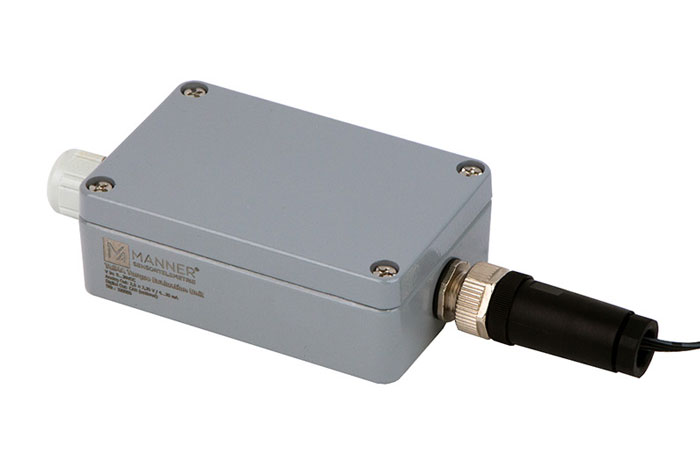
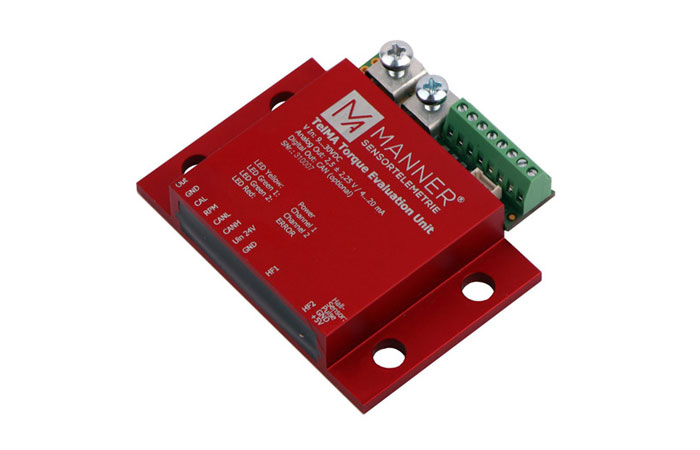
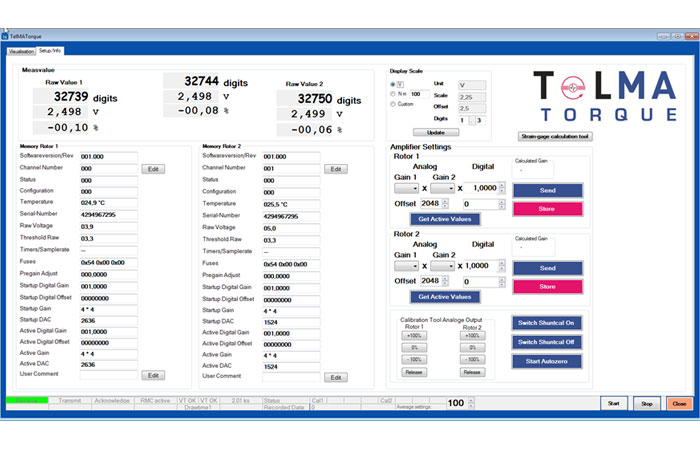
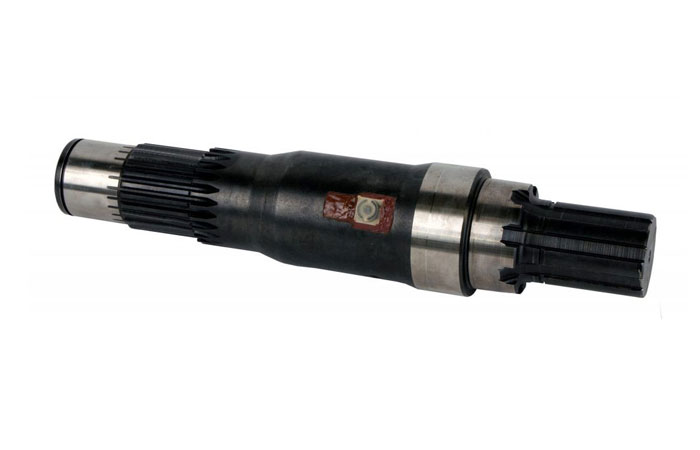





TelMA Torque
- In the case of drive shafts subjected to bending moments, any bending moment influences in the signal can be compensated for by mounting two elements.
The signals are detected via a standing induction loop. The induction loop is available as an insulated endless cable material or in the form of an enamelled copper wire, which is embedded in a carrier. The carrier can be manufactured using 3D printing or conventionally. Finally, the induction loop is connected to the evaluation unit at the designated terminals. Optionally, a speed sensor is connected.- Standard thickness B: 3.2 mm
- Inner diameter Di: variable
- Outer diameter Da= Di+ 12 mm
- (Diameter according to customer requirements)
Industrial Version IP67- Dimensions: 131,8 mm x 64 mm x 34 mm
OEM Version IP40- Dimensions: 60,0 mm x 51 mm x 15,491 mm
The system is now ready for use. The data output is now done via CAN; voltage or current output.
For adjustment, the measuring range is set using the remote control software. The remote control software also offers test functions (calibration shunt, supply voltage) and helpful memory functions for storing relevant background information.
Optionally, a data logging function can also be acquired via software.
TelMAX Torque – the weldable torque measurement without soldering and gluing

revolutionary. miniaturised. contactless.
The elegant method of torque detection/monitoring on drive trains in the field and on machines (gearboxes, pumps, motors, marine drives, cardan shafts). It is particularly suitable as a retro-fit due to the short installation time in existing systems. In contrast to classic strain gauge bonding technology with quasi clean room conditions, TelMAX Torque can be mounted in the shortest possible time even under the harshest environmental conditions.
Often the time factor for installation plays a decisive role. Bonding and adhesive curing times for strain gauges lead to long downtimes, which are to be avoided. Long idle times are undesirable. Another challenge in the field of measurement technology for larger machines is to transport the shaft parts or to realise the application capability on site without large transports.
Especially in the field of large machinery, agriculture and cardan shafts for trucks and construction machinery, TelMAX Torque is intended to provide an alternative solution to conventional sensor and telemetry application.
The system:
- TelMAX is a patented plug and play system – TelMAX Torque.

General measurement setup:

TelMA torsion sensor – weldable:
- The application of the miniaturised telemetric sensor TelMA Torque with integrated temperature detection can be realised within 3 minutes. Using micro-welding technology, the finished telemetric torsion sensor is applied without wiring or gluing. The system works with one as well as with two sensor elements. By using two sensor elements, an automatic bending moment compensation is activated.
The integrated torque measuring cells (torsion sensor) with contactless signal transmission are simply welded onto the shaft body.
The torsion sensor technology used in the rotors is based on strain gauge technology and is correspondingly reliable and has been successful in the field for more than 90 years.
The telemetry interface with antenna is integrated in the torsion sensor element.
Thus, the element is completely battery-free and maintenance-free after welding.
The high signal sampling rate of 2000 samples/second guarantees a high signal resolution of 0.5 kHz. This means that dynamic torque signals can also be recorded without any problems.

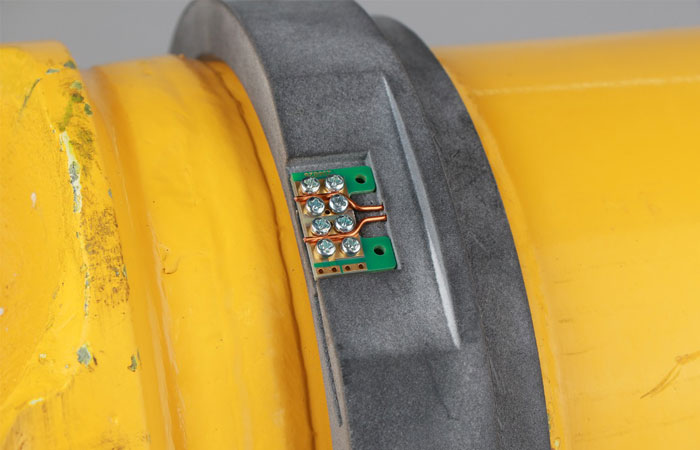


Rotor antenna system:
- For recording the telemetry data at a distance of up to 10 mm, an antenna support with integrated copper wire and intelligent adjustment module is clamped onto the shaft. This antenna carrier made of plastic or 3D print can have any diameter from 30 mm…1000 mm. After inserting the copper track, the wire can simply be screwed in place.
The complete application of the rotor is ready.
Stator evaluation unit:
The final component of the system is the robust IP67 evaluation unit with integrated stator antenna. The evaluation unit inductively transmits energy and data via an air gap of up to 10 mm between the rotating shaft and the supply unit.
The system’s supply voltage of 9-30 V also offers enormous flexibility in use, e.g. in vehicle operation. In addition to the usual 2.5 V +/- 2.25 V voltage output, a current output (4…20 mA) is also available. The additional CAN interface also allows direct digital signal transmission.
The system can be used directly and, if necessary, can still be configured accordingly (sensor name, sample rate, information deposit etc.) and calibrated (zero point and gain settings) by the MANNER software “Telemetry Interface”.
The system is particularly easy to use and requires no prior knowledge of electronics.
Your advantages at a glance:- large transmission distance (shaft – stator unit)
- insensitive to magnetic fields
- no problem with shaft currents in hybrid or electric drives
- free choice of material (no need for ferromagnetic materials)
- no influence of shaft displacements/radial oscillations on the measuring signal
- good measuring signal quality even with low torsional stresses
- Higher accuracy by a factor of ten than with magnetic methods
Torque Measuring Shafts

The compact and inexpensive solution for component test benches
The alternative to mounted sensors or flange solutions!
- The classic torque shaft for test bench measuring tasks has many disadvantages compared to bearingless measuring shafts. The classical measuring shaft is usually supported by bearings and may even be constructed with slip rings. Due to the necessary bearings, wear and a force shunt is automatically included. It also requires a bearing block and corresponding couplings that are flexible on both sides. In addition, the noise of the bearings is disturbing in certain test applications. In addition, the entire test rig design can be made more compact. This is also the reason why the mounted measuring shaft was replaced by bearingless solutions in the automotive test fields.
The company MANNER Sensortelemetrie offers bearingless torque measuring shafts. This solution is more favorable from an overall point of view, as the couplings and the bearing bracket can be dispensed with. Furthermore, more compact designs are possible. Especially when it comes to accuracy, the bearingless shaft has clear advantages. The basic accuracy of MANNER measuring shafts is better than 0.05 %. This is not possible with a bearing-mounted measuring shaft. MANNER also offers an optional integrated speed measurement.
Couplings and bearings are problematic at high speeds. The selection of a suitable coupling taking into account the shaft dynamics requires special knowledge. Many test stand builders have despaired of shaft vibrations on the wrong couplings. The bearingless measuring shaft from MANNER can be used up to 150,000 rpm.
MANNER Sensortelemetrie has developed special short-designed bearingless torque transducers from 1 Nm to 1 kNm to solve test bench applications. Characteristic features are the extremely low moment of inertia, the high-speed stability and the simple integration into the shaft train. The connection to the shaft train is made via inexpensive Lenze clamping couplings or via a bellows coupling. All torque acquisition systems from MANNER Sensortelemetrie are characterized by the contactless transmission of the torque signal using the patented sensor telemetry method.
The torque signal is obtained using strain gauges. A high-precision, remotely programmable measuring amplifier on the shaft amplifies, conditions and digitizes the measured value with 16 bit resolution. The non-contact transmission is characterized by an antenna gap of up to 10 m. Mounting is therefore absolutely unproblematic in radial and axial direction. The torque data can be output analog or digital via CAN, EtherCAT, Ethernet or USB. The engineering group of the company MANNER Sensortelemetrie will be pleased to advise you and will also manufacture custom-made torque transducers for the respective customer requirements.
Vehicle Transducers

Know-how and operational reliability for vehicle optimization
Improved measuring equipment is an essential requirement for further vehicle optimization and thus also for meeting legal requirements.
In the meantime, it had to be acknowledged that tests and measurements on the test bench only partially reflect reality. Measurements under real driving conditions are indispensable for realistic consumption and emission considerations.
Precise knowledge of the dynamic torque curve at various points in the powertrain is of decisive importance for assessing and exploiting optimization potential. In the meantime, the large optimization potentials have been exhausted. In order to exhaust the further optimization potentials in the lower % range, the demands on the accuracy of the measurement technology have increased enormously. It must be possible to record the small improvements/difference values significantly and reproducibly. For mapping purposes, the corresponding measurement technology must be better by a factor of 10.
However, the greatest error is caused by the large temperature fluctuations. In order to exploit further optimization potentials, it is necessary to correct these deviations.
In order to meet today’s requirements of vehicle engineers and the metrological reality of the test environment, MANNER has developed a real-time signal processor that calculates the real torque value from the recorded torque value, the transducer temperature and the corresponding calibration curves. For this purpose, calibrations are performed at different ambient temperatures. A suitably air-conditioned, high-precision torque calibration stand provides the reference data for zero point and measured value.Calibration Laboratory
- With these methods it is possible to realize torque transducers which provide constant measured values with a measuring accuracy of better than 0.05 % over the entire environmental temperature range.
In addition to this new development, the minimization of interference effects of parasitic forces by appropriate transducer design as well as high-quality and complex strain gage bonding is of high relevance.
Customized Measuring Sensors

According to your requirements
Customized Measuring Sensors
-
Whether on the test bench or in practice – today’s high demands on power density and service life place the highest requirements on technical measurements. High temperatures up to 200 ° C, high speeds (> 100,000 ), electromagnetic compatibility and last but not least a very confined space.
What if a standardized transducer does not meet the requirements with regard to design, interface, accuracy, speed stability or other aspects?
Or if it has to be measured on the original part, no space is available for additional components?
What if multi-range or multi-component transducers are needed? A discipline in which only a few suppliers can deliver.
It is a fact that the measuring task must still be completed. Neither restrictions on the measuring accuracy nor on the robustness of the system must be accepted. The installation space is often predetermined, a measuring element is not even taken into account and the environmental conditions at the measuring element are predefined.
The development engineer is close to despair – the project is threatening to stop.
We do not offer just any solution, but THE solution for your measuring task. Trust us, we are your partner for success.
Dual-Range Torque Transducer

two-in-one. precise. dynamic.

Dual-Range Torque Transducer
- As the requirements to measure torques of different load ranges with one measuring element are increasing, MANNER now offers the standard dual-range torque transducer XtreMA “two-in-one”.
This means that very high and very low torques can be easily recorded and measured very precisely with one measuring sensor.
The XtreMA “two-in-one” has two separate independent signal outputs. Both measuring ranges, nominal and spread, are optimized in terms of accuracy.
Two calibrations with corresponding calibration protocols are created for the transducer to be evaluated. The zero point drift Tk0 and also the characteristic value drift Tkc over temperature of both channels are minimized to the respective measuring range.
This allows the XtreMA “two-in-one” to be used over a much wider torque range with the highest accuracy and resolution. The user can decide which channel is used for the corresponding measuring task.
The tasks of nominal torque measurement, as well as friction power measurement, can be solved without modifications in the drive train using a measuring device. This saves time, costs and minimizes the risk of making mistakes. The accuracy of our transducers is proven by our new calibration laboratory – which is certified according to DAkkS.
This new transducer is tough.
Due to an overload design of 400% of the nominal measuring range, the torque sensor is suitable both for measuring continuous loads and for detecting peak loads from load peaks in dynamic operation.
Despite this new technology, the stator antenna remains compact and has the familiar design with an air gap to the rotor of up to 10mm.
In the standard version of the XtreMA “two-in-one” the evaluation unit is available with 2 analog outputs with ±10 V or two frequency outputs with 60 kHz ±30 kHz, other versions are optionally available.
Optionally and with an appropriate configuration of the complete system, the range between the “two-in-one” and the stator antenna can be increased up to 50mm.
The modular MANNER system allows free selection and configuration of the evaluation unit. The XtreMA “two-in-one” can be operated with the compact XtreMA evaluation unit as well as all other designs and configurations. A remote stator antenna as well as the tube version with or without integrated stator antenna is possible.
In the tube version, the power evaluation unit or the table-top version, in addition to the classic analog signals with 0. ±10V / 4..20mA or the frequency output, the output of digital signals via EtherCAT, CAN, Ethernet, or USB can be realized.
As an add-on, a speed measurement can be added at any time. This speed measurement can be realized in high resolution, as single track or with track A/B as well as with one pulse/min.

Calibration
- In-house for fast delivery times and flexibility – Durch das Thanks to the automated and expanded calibration laboratory with 6 test benches, MANNER In-House can offer a comprehensive range of calibrations and uses this both for its own products and for calibration services.
Software for Measuring Engineers
Telemetry Interface
Remote. Analysis. Post-Processing.
The Telemetry Interface Application software by MANNER for MANNER products
MANNER offers its customers tailor-made software for their telemetry systems. This enables them to make the necessary settings themselves – conveniently via their PC.
The telemetry interface is a software which takes over the following tasks:- Remote setup of the rotor electronics
- Programming the gain / sensitivity
- Rotor-side zero-point drift compensation with Auto-Zero function
- Temperature-dependent modulus of elasticity Compensation
- Linearization of thermocouples
- Compensation of cross-talk behavior of multi-component transducers (channel computer)
- Sensor check by cal function
- Measurement data Data storage
Data Analysis and Post-Processing with FlexPro
We also work together with the company Weisang. The FlexPro2019 program is a powerful analysis tool and is used in post-processing.MAcquisition
Software for Measuring Engineers
The Measurement, configuration, data acquisition, monitoring and data analysis software for sensor telemetry – A MANNER product!
MAcquisition is the new software solution for your sensor telemetry. Measuring, configuring sensor telemetry, real-time visualisation of the measurement data and a comfortable data logging – easy to look & feel. The newly developed telemetry software offers the user many functions for easy setting and measurement. A configuration file allows you to start directly with your supplied measurement system without having to configure anything yourself – plug & play. Learn more!
Guaranteed simplicity of use and convenient adjustment of sensor telemetry for your measuring task
For ease of use, MAcquisition offers the Plug and Play solution for your measurement start-up. You receive a software configuration file with your new telemetry application, which enables you to measure immediately without any setting adjustments.
The application itself is easy to use. All explanations are integrated in the software. This makes the application not only intuitive to use, but also offers learning by doing with support through tool tips.
The system offers convenient telemetry setup (Figure 1). Health monitoring data is directly available to check the quality of the antenna installation and the current amplifier settings. With a simple click, the configurations such as gain, offset or sampling rate as well as the number of desired channels can be set. The measured value correction via temperature is also possible.
The new sensor setting offers a particularly convenient feature. The user can select from a variety of sensor types (half bridge, full, quarter bridge, insulated and non-insulated thermocouples, RTD sensor, etc.) and at the same time receives the schematic of the connection as well as the possibility to carry out the hardware tests.Data Visualisation and Analysis – Online
The new data visualisation options, including an integrated oscilloscope, offer extensive online analysis options.
The visualisation is freely configurable by the user with regard to the number of measuring channels to be displayed and their colour design.
Typical scope functions such as trigger, cursor and measurements on the signal are integrated.
The measurement channels can be displayed in one data window or in several data windows within the scope of the analysis and complete the concept. The signal can be zoomed as desired. Different diagrams and several scopes in parallel are also possible. Thus, all data analysis options are provided and allow the data to be viewed without further aids. This also includes online FFT, classification diagrams (waterfall diagrams).Data acquisition – Freely configurable with automatic filing and filtering
Optionally, an integrated data collection software with all data reduction options, export files and other conveniences can be purchased. The data collection also allows the creation of several automatically created files in order to record only certain time periods, if necessary, or to record only a certain time (e.g. 2 days). Storage is fully automatic.
In addition to the data view in the software, different export formats, which can be extended on customer request, are implemented. MANNER’s partner is Pro Flex. However, CSV export and other export formats are available.
The data can be recorded directly or in the converted unit such as Nm or a calculated quantity such as power (speed and torque).Smart Interface
Smart Interface with MANNER App
- Smart. Wireless. Connected Measurement.
MANNER Smart Interface with MANNER App - SMART, WIRELESS & connected Measurement
Viewing and reviewing sensor data, limited to the workplace, no longer meets the modern standard of connectivity.
Smart services such as the smartphone or tablet have become indispensable not only in the private sphere, but are also increasingly taking on a role in the working environment. MANNER now also presents this possibility for sensor telemetry.
The MANNER Smart Interface in combination with the MANNER App allows the user to check the measurement data, or also important other parameters such as the supply voltage, the temperature or the sensor check anywhere without a physical connection.
The Wi-Fi hotspot integrated in the evaluation unit allows the desired smart device – whether Android smartphone, Apple iPad or Apple iPhone – to be connected directly. Alternatively, of course, a network connection can be established.
The focus of the development was simple connectivity. For easy search or reconnection, the QR code of the desired measuring device can be scanned and the connection is established. Each measuring application can in turn be assigned a name so that it is possible to switch between several applications without swapping them.
The capabilities of the MANNER app are fully comprehensive. All configuration parameters of the sensor such as the measuring range setting, zero point or the general health data such as the voltage supply can be conveniently set and also saved for documentation. Especially for field applications, where antenna positions can still slip after mounting on the lifting platform and after spring deflection, a glance at the smartphone is enough to check the supply voltage again for successful measurement.
It is also now possible to easily change the measuring range during field tests. For example, in side-wave applications, the measuring range resolution can be adjusted based on the test scenario. Thus, your application can be realised for several measuring ranges with easy changeover!
While driving, the data can be viewed, analysed and visualised live in the oscilloscope of the app. These analyses can be recorded for later viewing.
The app is an innovative solution that makes everyday measurement with sensor telemetry more convenient.
Applications
Automotive Applications
-
Whether combustion engines or electric cars – minimizing CO2 emissions, optimizing driving comfort and that combined with powerful engines are the driving forces behind the automotive industry.
In times of constantly increasing demands to the vehicle, the metrological testing of automotive components and the efficiency analysis of complete vehicles are becoming more important than ever. This requires robust and powerful measuring systems that deliver precise and reliable results both on the test bench and in driving tests. Extreme temperature differences, vibrations and contamination must not be limiting factors. Als important is the possibility of a retrofit. This means that the measurement technology must be integrated into components that have already been implemented. The machine is retrofitted with measurement technology. For this MANNET can adapt its technology components to a high degree and still use impossible installation spaces to enable a retrofit.
But attributes such as precision and reliability, along with durability and flexibility, are just some of the outstanding features of our MANNER measurement solutions.
Digital data acquisition via CAN and EtherCAT are just as self-evident as the electromagnetic compatibility of our systems. Driven by constantly growing customer requirements and driven by the tireless innovative strength of our development engineers, we have always offered our customers high-tech at the highest level! It is not without reason that we now have all the well-known automobile manufacturers and numerous suppliers among our satisfied regular customers.
Below, you can find solutions for the core areas of modern mobility 
Combustion Engine
- Our products support you in optimizing performance, efficiency and durability in all relevant areas of the combustion engine in order to obtain highly precise measured values of the engine components.

Powertrain
- Non-contact measuring systems for determining torque, temperature, axial pressure, speed, vibration and power to ensure operational stability.

Turbocharger
- In addition to measurements of blade vibrations and bearing temperatures, our systems offer highly precise measurement of torques on the turbocharger shaft.

Electric Motor
- Measurements in and on the electric motor are an extreme challenge due to the high voltages, which are also clocked at very high frequencies. MANNER has developed measuring amplifiers and technologies especially for this application in order to be immune to these interferences.
High-precision measurements on the electric motor are a challenge that we have taken up and mastered.
Aviation Applications
Aircrafts
- Telemetry measurement systems for highest requirements
MANNER measuring systems also find an important field of application around 10,000 meters above the earth’s surface. Whether for the vibration analysis of the individual drive components or for temperature measurement on the turbine shovels: With a wide range of measuring applications on the aircraft turbine, MANNER Sensortelemetrie GmbH makes a valuable contribution to energy-efficient aviation. Only by means of modern measurement technology can transport performance be increased while fuel consumption is continually reduced.
In addition to precision and efficiency, the aerospace industry is above all looking for reliability. Because almost nowhere else are safety requirements as high as here. This also applies to the measuring technology of the MANNER company, which has proven itself repeatedly and reliably in many years of use in helicopters and aircraft.
Particularly in the area of landing flaps or helicopter main rotors, operational stability is of enormous importance for safety. Here, where MANNER measuring systems are also used, resistance to temperatures, climatic conditions, air pollution and other expected environmental influences is essential. The extremely compact and low-weight elements of the system guarantee that there is no reaction to the drive edge caused by the installation of the measuring technology. MANNER Sensortelemetrie GmbH cooperates with customers in the aerospace industry worldwide in order to be able to continue successfully meeting the increasing demands on measurement applications.
Airplanes
The aircraft gas turbine in its various designs forms the engine of an aircraft and performs a wide variety of functions. In the most varied designs, adequate measurement technology is required to meet the central significance of the turbine components.
The efficiency of the individual engine components plays an exorbitant role when it comes to increasing transport performance and simultaneously reducing fuel consumption.- Turbine
- Flaps
Helicopter
Helicopters, the supreme discipline of aviation. Especially with such complex aircraft as helicopters, the safety with which the measuring systems record data and their reliability is of the greatest importance.
The data is often collected for Health and Usage Monitoring (HUMS) systems or for the development of new systems. These systems ensure the flight performance of the device.
MANNER telemetry systems are extremely reliable and fail-safe. Combined with the robustness of our technology we are the partner of trust when it comes to helicopters.
Whether for the development and design of new helicopters or for monitoring mast torques and temperatures in series models, with MANNER you can rely on outstanding quality and excellent service!- Main Rotor
- Tail Rotor
Shipping Industry Applications
Telemetry measurement systems for highest requirements

Application on Large Engines
- Also on the high seas our MANNER measurement technology is at home. Whether torque applications on internal and external ship engines or efficiency and effectiveness analyses of cost-intensive drive elements – our premise is always simple assembly and maximum precision. In the world of large engines, this is an ambitious challenge that we face up to every day with great enthusiasm and above all with maximum success.
The components of the drive train of ships, such as gear and drive shafts, are increasingly being fitted with the measuring systems of MANNER Sensortelemetrie GmbH in order to optimize the efficiency and effectiveness of the cost-intensive systems.
An important field of application in shipping is MANNER piston telemetry, which has become an important tool for the development of pistons and for the verification of their strength. By evaluating the thermal and mechanical load within a piston, important conclusions can be drawn for the optimal design of the pistons. But MANNER does not only make a direct and significant contribution to modern and efficient shipping with regard to piston optimization.
The dynamic load analysis on the connecting rod is also close to the heart of our customers in the large engine sector. No wonder, considering the extent of the extreme tension-compression alternating loads exerted on a connecting rod of this magnitude. For many years MANNER has been providing its customers with professional support for force measurements at any connecting rod points and for temperature measurements in the various connecting rod bearings using non-contact measurement data transmission.- Piston Temperature
- Piston Load
- Valve Temperature
- Connecting Rod Load
- Connecting Rod Bearing Temperature

Application on the Drive Shaft
- Our torque applications on internal or external marine engines are easy to mount and available in any size for the corresponding shaft. Depending on the type of marine propulsion system, we adapt our single or multi-channel sensor telemetry to the engine design.
Other components of the drive train of ships, such as gear shafts, are also increasingly being equipped with MANNER Sensortelemetrie GmbH measuring systems in order to optimize the efficiency and effectiveness of cost-intensive systems.
You can also profit from our ongoing activities in the research and development of the latest measuring methods using near field telemetry. In doing so, you can rely on our many years of experience in measurement applications on ship propulsion components.
Rail Transport
Applications for Rail Transport
- Telemetry measurement systems for highest requirements
The advanced rail vehicles of our time are subject to constant technical changes. With technical progress and the constant drive for further optimization, the demand for precise and efficient measuring instruments is also increasing. A demand that MANNER also sets permanently and consistently for its measuring systems.
As the market leader in sensor-telemetric measuring applications, MANNER maintains close cooperation with the high-tech “railway” sector. MANNER offers individual and customer-specific solutions based on non-contact measurement data transmission for a wide range of measuring points and components of the rail vehicle. In addition to torque applications on all types of railway shafts, MANNER Sensortelemetrie GmbH also implements, for example, single-channel or multi-channel measurement of shaft load variables using patented measuring methods.
By considering operational and fatigue strength, creating load profiles and calculating various degrees of utilization, maintenance and servicing measures can be planned more easily and precisely.
In this way, MANNER Sensortelemetrie GmbH meets the requirements of so-called “Predictive Maintenance” (i.e. proactive maintenance and servicing), one of the central aspects of “Industry 4.0”.
Wind Turbines
Applications on Wind Turbines
- Telemetry measurement systems for highest requirements
In these times in which climate protection is becoming more and more popular, wind power is becoming increasingly important as a renewable energy source and inexhaustible resource. More and more wind power plants convert the kinetic energy of the wind into electrical energy and feed it into the worldwide power grid. This requires an intelligent system consisting of generator, control system, gearbox and rotor blades. However, this system only becomes functional, reliable and efficient thanks to MANNER’s sophisticated measurement technology.
For years, we have been supporting leading companies in the wind power industry with customer-specific measuring tools and precisely fitting solutions based on non-contact, self-sufficient and maintenance-free MANNER sensor telemetry.
Whether enormous bending and torque torques on the rotor or extreme speeds on the generator – MANNER Sensortelemetrie GmbH designs an optimum measuring concept for all applications that starts where normal electronics fail.
Our application portfolio:- Bending and torsion moments
- Vibration analyses
- Compressive and tensile loads of individual drive train components
- Temperature monitoring of heat-sensitive components
The focus of our experts for wind turbines is always on optimizing service life, efficiency and costs.
Turbines
Applications for Turbines
- Telemetry measurement systems for highest requirements
Turbines are among the most powerful machines of all. The mechanically usable power of turbines, which can amount to an incredible 1.5 gigawatts, is obtained via the turbine blades and finally delivered to coupled machines via turbine shafts, where the highest speeds dominate. Knowing the load on the blades, especially when vibrations are excited, is of enormous importance for qualification. The same applies to thermal loading. MANNER measuring technology allows these variables to be recorded dynamically and the operational stability of the turbine to be derived from the data. Our measuring systems are used in this extreme and challenging environment where, among other things, accuracy, robustness and temperature stability are required.
MANNER Sensortelemetrie GmbH has been proving its know-how in the challenging measurement application of single or multi-shaft turbine machines for many years.
With the help of our non-contact sensor telemetry, the thermal load on the turbine blades can be determined just as easily and precisely as the rotational speed or blade vibrations. In this way, material fatigue on the blades can be avoided, thus preventing fatal damage, while the simple collection of measurement data is guaranteed by specially programmed telemetry software.
Through torque monitoring and the measurement of further characteristic values, we also help our international customers to continuously optimize the performance, efficiency and effectiveness of complex turbine systems and thus achieve decisive competitive advantages.- Torque Monitoring
- Temperature Profile
- Vibration Analysis
Mechanical Engineering

Applications for Mechanical Engineering
- Mechanical and plant engineering is considered one of the leading export and innovation sectors in Germany. It is not surprising that measurement technology plays a particularly important role here. For several years we have been accompanying leading machine manufacturers on their way from the test field to series production. In this way, we support our customers worldwide in measuring torques, speeds, efficiencies, temperatures as well as compressive, tensile and bending forces.
The requirements of today’s machine designs are high, and this naturally also applies to their measurement applications. Not least because of the untiring commitment of our energetic and hard-working design team, which constantly strives for space-saving and maintenance-free assembly, we are able to meet the immense demands.
Our sensor telemetry applications are the optimal solution for the precise recording of the most versatile process data and the contactless and safe transmission of this data to the corresponding evaluation units. Whether for increasing the efficiency of a gearbox or for monitoring complete production facilities – MANNER Sensortelemetrie GmbH supplies the right sensor telemetry for every measuring task.- Drive Train
- Gearbox / Efficiency
- Gearbox / Operational Stability
- Load Monitoring / Load Limitation

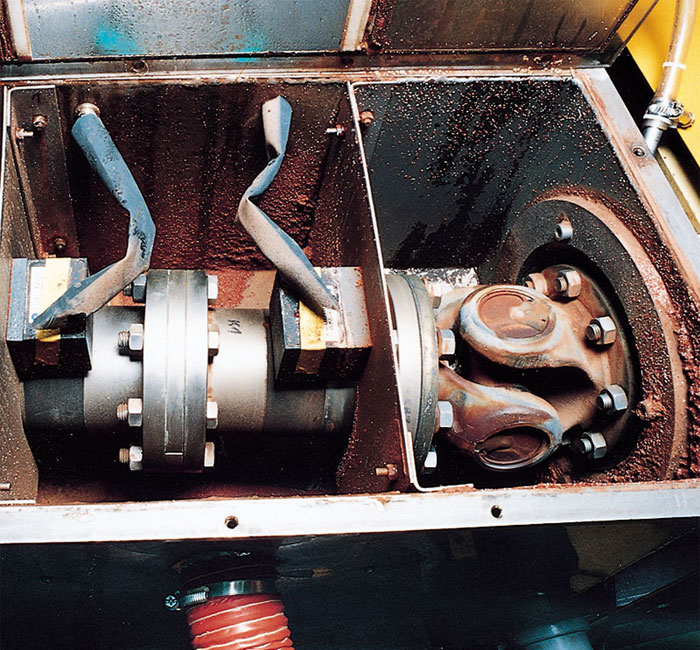


Test Benches
- In order to be able to examine the most diverse components in detail, independent of their normal field of application, exact performance test systems and/or test stands are required. MANNER Sensortelemetrie GmbH offers test stand manufacturers and users customer-specific measuring applications for the precise recording of torques, bending moments, speeds, temperatures, forces and power.
Extreme conditions must be created so that weak points can be determined in a shorter time. In order to create such exceptional conditions exactly and consistently, extraordinarily precise and robust measuring systems are usually required.
Take advantage of our expertise in individual measurement applications and contact us so that we can work out an optimal solution for your test bench measurement.
Process Monitoring
Process Monitoring and OEM
- As complex and specific as industrial plants and production facilities are structured, MANNER manufactures the appropriate measuring applications for tough continuous operation. In the field of oil-free gas and air compression as well as in the application field of extruder screws, the most accurate recording of torques, forces and temperatures is ensured by the contactless transmission of measurement data in our sensor telemetry applications. Long-term monitoring of extruder shafts thus becomes as easy as automated machine monitoring of thermal loads.
MANNER Sensortelemetrie GmbH offers miniaturized applications for the monitoring and protection of automated production plants for the detection of a wide range of drive powers. In this way, production operations can be stopped automatically and without disturbance if the load limits of individual components are exceeded. Our company develops such early damage detection and damage prevention devices for a wide range of production plants in a variety of industries and manufacturers. In this form, MANNER’s easy-to-install measuring systems make a decisive contribution to optimizing the service life, strength, efficiency and effectiveness of production plants.- Extruder
- Gas Compression
- Rotor Temperature
- Load Limitation / Load Monitoring
Services
The Calibration Laboratory

1 N·m – 500 kN·m
Calibration of force measuring elements
Every force gauge only delivers correct results if it is regularly checked, i.e. correctly calibrated and, if necessary, adjusted. Only with documented calibration a force gauge become a reliable measuring and testing device.
MANNER offers calibrations of force transducers based on DIN EN ISO 10012.
The test benches for force measurement and transducers are capable of calibrating tensile and compression loads from 0,1 N to 100 kN.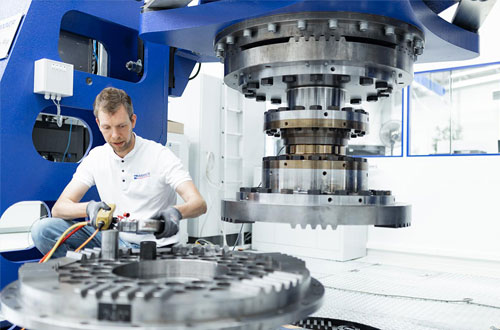
DAkkS- calibrations, Factory and special calibrations
- MANNER Sensortelemetrie has established a state-of-the-art calibration laboratory that offers a wide range of torque calibrations. The calibration laboratory is accredited according to DIN EN ISO/IEC 17025:2018 and offers DAkkS calibrations according to DIN 51309 and factory calibrations based on DIN EN ISO 10012. This is the logical step in the expansion of the torque division.
From miniature transducers to 500 kN·m ship flanges, all customer requirements can be covered directly at the company headquarters. A crane runway with a load capacity of up to 4 tons enables professional and efficient handling of large transducers.
Due to increasing regulations for climate protection and the problem of the diesel gate, more and more accurate and traceable calibrations of measuring sensors are required.
This increasingly required calibration of measuring equipment affects all industries. In order to fully meet this demand, MANNER has included DAkkS accreditation in its portfolio.
In addition, the quality feature of reproducibility as well as the reduction of throughput times through automation could be achieved. MANNER also passes on this further development, which is reflected in the costs, to its customers. Feel free to ask for your transducer!
Throughput times for your calibrationMeasured Variable Throughput time Acclimatisation time* 100 N·m – 5 kN·m 6 working days + 1 day 5 kN·m – 50 kN·m 8.5 working days + 1.5 days 50 kN·m – 500 kN· m10 working days + 3 days (*only for DAkkS calibrations)
Optional: 48h calibration service (with DAkkS plus acclimatization time)

The calibration systems - 100 N·m system
- 100 N·m system
Expanded uncertainty: 0.2 %
System for miniature transducers (e.g. spindles or turbochargers) with calibration ranges between 1 N·m and 100 N·m.

The calibration systems - 1 kN·m system
- 1 kN·m system
Expanded uncertainty:
0.04 % > 100 N·m
System for customer-specific transducers (e.g. pulleys or measuring sensors) with a calibration range of up to 1 kN·m.

The calibration systems - 5 kN·m system
- Expanded uncertainty:
0.04 % > 500 N·m
Two systems for a wide range of applications: transducers, passenger car side shafts, transmission flanges or distributor shafts for aircraft landing flap systems. Due to the variable adjustment of the length, both short flanges and transducers with lengths of up to 3 m can be calibrated.

The calibration systems - 50 kN·m system
- 50 kN·m system
Expanded uncertainty:
0.04 % > 2 kN·m
0.2 % > 20 kN·m
Vertical calibration system, mainly for applications in the truck and heavy machinery industry. The generous installation space also allows calibrations of bulky special transducers.

The calibration systems - 500 kN·m system
- 500 kN·m system
Expanded uncertainty:
0.1 % > 20 kN·m
System for standard torque transducers and special transducers in the field of shipping, large gears or wind power plants. These transducers can be manufactured and/or calibrated at MANNER.
Training
Training
- MANNER stands for quality. High-tech and know-how are combined in our products. Our goal and that of our development engineers is to make the systems as intuitive as possible to operate. Nevertheless, sensor telemetry is a high technology and depending on the complexity of the system and the existing previous knowledge, training is advisable and also desired by the customer.
Our training staff are engineers, technicians and electronic technicians who have been able to gain several years of experience in MANNER telemetry systems and who have also been specially educated in the subject of training.
We offer tailor-made training courses or one of our 1-3 day training courses. The duration of the training depends on the desired depth of knowledge as well as the complexity of the system.
Furthermore, we offer permanent training in the following areas:- Piston telemetry
- Motor telemetry
- Amplifiers on Flexible Substrate
- Strain gages
- TelMA Torque
MANNER guarantees successful training and perfect knowledge transfer. With the training we want to enable you to use our systems with the greatest success. Last but not least, this is why we are always at your side with help and advice, even in the event of later questions.
on-site Service
MANNER on-site Service
- At your side in every project phase
Despite the fact that we, as specialists in our field, supply documentation and start-up instructions specially tailored to your system, on-site commissioning by our trained specialists is particularly low-risk for you as a customer.
Be it for initial or re-commissioning or for (express) repairs, we are there for you – ALWAYS and directly on site.
Toughest conditions, missions in every corner of the world, with MANNER you get an all-round carefree package!
Consulting / Engineering
Failure is not an option!
MANNER Sensortelemetrie has been a competent partner to industry and research for over 29 years. MANNER’s competence has been proven over the long term. Our experience, which has grown over the decades through a multitude of projects, enables us to solve problems professionally. MANNER sees itself as a specialist for tasks which are impossible to solve by third parties.Our motto is: „Failure is not an option!”
Many of our customers already bring us on board during the planning phase. Together we design the best measuring system for your task – both constructively and technically.
Data collection is directly related to data analysis. Our experience enables us to provide our customers with useful and important information to evaluate their measurement data accordingly. Use our know-how, we are there for you!
In this way it can be ensured that all challenges are taken into account and that the project can be realized by the customer without any compromises.
MANNER sees itself not only as a supplier, but also as a service provider, consultant, developer and partner for product developers!
We help you to realize validation tasks on aggregates even under the most difficult conditions. The MANNER Engineering Team also takes care of the constructive integration of the measurement technology into the test object. This naturally includes speed strength analyses using finite element simulation.OEM & Series Production
customized product and series solutions
As complex and specifically designed as industrial plants and production facilities are, MANNER manufactures the appropriate measuring applications for tough continuous use. In the field of oil-free gas and air compression as well as in the application field of extruder screws, precise measurements of torques, forces and temperatures are ensured by the non-contact measurement data transmission of our sensor telemetry applications. Long-term monitoring of extruder shafts is therefore child’s play, as is automated machine monitoring of thermal loads.
MANNER Sensortelemetrie GmbH offers miniaturised applications for the monitoring and protection of automated production systems for recording a wide range of drive powers. This means that production can be stopped automatically and trouble-free if the load limits of individual components are exceeded. Our company develops such early damage detection and damage prevention devices for a wide variety of Production plants of various industries and manufacturers.
In this form, MANNER’s easy-to-assemble measuring systems make a decisive contribution to optimising the service life, strength, efficiency and efficiency of production plants. As a leading specialist for non-contact and robust transmission technology, MANNER also offers its customers tailor-made OEM solutions.
Together with you we develop innovative and attractive solutions. We see ourselves as a partner who supports you throughout the entire process, from the idea through design to the technical implementation in your product.
The solutions can be produced in-house for you at the desired time and with the highest quality or passed on to you in the form of a license.
In this way, we already produce a wide variety of different edition sizes for national and international partner companies.
Below, you can find our selected OEM solutions
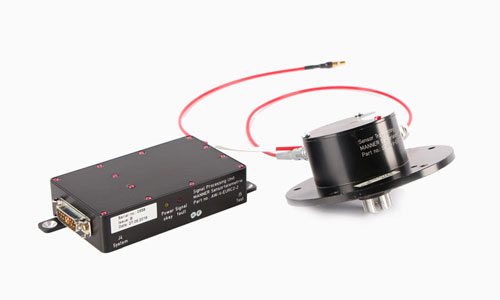
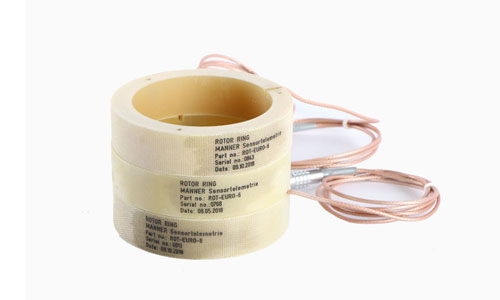
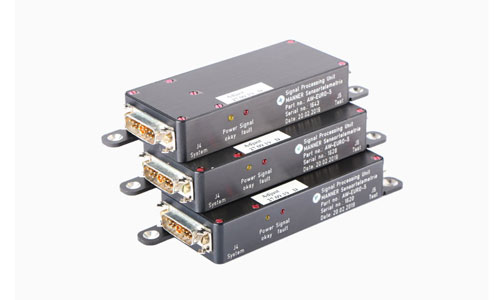




Helicopter (mast bending moment monitoring)
- The main rotor of a helicopter provides both the lift of the aircraft and the direction of movement and is therefore a control element.
The loads introduced into the system lead to bending and torques of the helicopter mast. Since the mast has no redundancy, it is a critical component of the helicopter in terms of reliability.
For this reason, the moments acting on the mast are carefully monitored.
The dynamic bending moment of the mast of various helicopter models is monitored by a monitoring system developed by MANNER.

Transmissions (predictive maintenance, load collectives, process control)
- To monitor and protect automated production equipment, MANNER Sensortelemetrie GmbH offers miniaturized applications for recording a wide range of drive powers. This means that production can be stopped immediately and automatically if the load limits of individual components are exceeded.
MANNER develops such early damage detection and damage prevention devices for a wide variety of manufacturing systems in a wide variety of manufacturing processes. Evaluate the most accurate measurement data curves for critical components in your production plant and optimize your systems for service life, strength, efficiency and thus efficiency.
Benefit from the advantages of MANNER sensor telemetry:- Accurate recording of torques, bending moments, temperatures, compressive and tensile forces at maximum speeds
- Non-contact data transmission by means of inductive coupling
- Easy utilisation of the measurement data via evaluation unit and specially programmed telemetry software from MANNER
- High accuracy and safety of the digital measurement data
- High temperature resistance
- Miniaturized and lightweight design
- Extremely low assembly effort

Cold rolling industry (process control)
- In the steel industry it’s “hot”. Not only in terms of temperature, but also in cold rolling mills the machines have to work hard.
The maintenance of machines is of great importance and an unforeseen breakdown of a machine has far-reaching consequences for the whole production. The keyword here is “predictive maintenance”. In this way, not only ” necessary ” maintenance can be predicted and the process can be shut down, but also the production quality of the machine can be monitored. This ensures protocol security, especially for international production lines.
The “retrofit” and thus the integration into the existing production process and production machines was important to the customer. The same applies to the maintenance-free measurement technology and the real-time acquisition of measurement data.

Extruder
- Extruders are widely used in the industrial production of plastics, food and cosmetics. In addition to single-screw extruders with a simple design, twin or multi-screw extruders require a complex gearbox to drive the counter-rotating or co-rotating extruder screws.
More and more sophisticated extruder shapes require gear technology that transfers the highest torques evenly to all screw shafts in the tightest of spaces. The actual torques at the screws and the exact distribution of these torques to the individual extruder shafts can be precisely determined with the aid of MANNER sensor telemetry.
You can finally answer critical questions regarding your extrusion operation, such as how:- What torques do the screws actually have to cope with?
- Is the load distribution evenly distributed over all screw shafts?
- Can the extruder control be better adapted to the occurring torques and forces?
- How does the extruder and its individual screw shafts behave in different production conditions?
We apply your coupling sleeves to the drive shafts with the proven sensor telemetry for extruder shafts and the proven MANNER sensor technology records the real torques where they occur. These torques are transmitted without contact via an induction antenna to a corresponding evaluation unit, your computer or your control system. In addition, specially developed software records the measured values, for example for long-term monitoring.

E-Bike (Scar Motor Torque Measurement)
- E-bikes have been part of road traffic for a few years now. Meanwhile, such an e-bike is no longer a rarity, but almost mass-produced. Nevertheless, the engine and the additional power brought in represent a risk in the sense of moments, if these should not be defined and controlled in doses.
For this reason, all e-bike manufacturers are obliged to monitor these torques more closely.
Electromagnetic compatibility (EMC) causes problems in processes such as magnetostriction (magnetic process for torque measurement). Torque measurement using non-contact telemetry from MANNER was able to meet this challenge and fully satisfy the customer with the OEM product.

Screwdriving industry
- The customer objective of this series solution for screwdriving robots in the automation line is to secure a defined torque. In addition, the system offers “predictive maintenance” as well as self-checks of the system. Ageing phenomena that lead to a deviating torque are thus eliminated.
The main challenges of this solution were the robustness of the system against shocks and vibrations, the parallel use of 16 spindles, for example, without mutual interference, and the development of a solution that permits various couplings (radial and axial).
The developed solution was realized in an installation space of 9mm in the spindle. There are several sizes and shapes which allow different couplings, screwdriver models and torques with the identical amplifier technology.
Also the integration into the customer acquisition and control system – in this case via a desired SPI interface – was realized.


